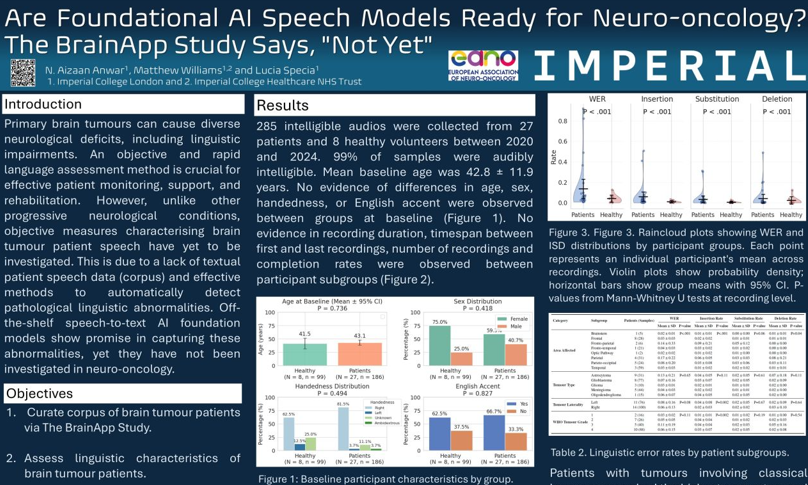
Dr Aizaan Anwar was accepted to present her work at the
EANO European Association of Neuro-Oncology 2025 Meeting. Title: “Are Foundational AI Models Ready for Neuro-oncology? The BrainApp Study Says, “Not Yet”. This exciting work explores linguistic abnormalities in adult primary brain tumour speech, and the ability of off-the-shelf foundational AI models in capturing these abnormalities. In the age of ambient AI, digital biomarkers and speech analytics for healthcare, real-world evaluation of technology is crucial before deployment in a high-stakes sector.
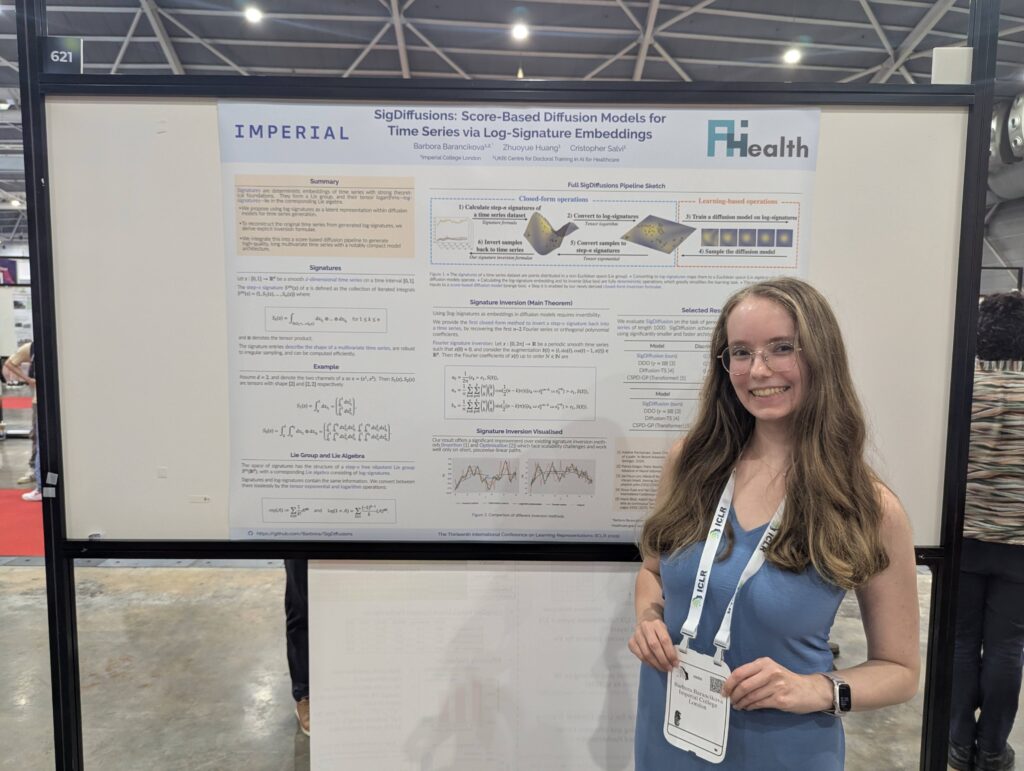
ICLR 2025 in Singapore was Barbora Barancikova’s first AI conference. A standout moment for her was Tim Rocktäschel’s keynote on the future of machine learning and AI safety. Barbora loved the poster sessions where she connected with authors and explored cutting-edge work. Many papers focused on generative models for biological applications, using advanced mathematics for non-Euclidean molecular data; this is also a direction she is excited to explore. She had a paper accepted by the conference, and presented her own poster which sparked great discussions and valuable feedback. Project topic: SigDiffusions: Score-Based Diffusion Models for Time Series via Log-Signature Embeddings.
Arthur Lefebvre, who began the AI4Health PhD programme in October 2024, was selected to attend the DLMI2025 Spring School, a research forum focused on deep learning for medical imaging. The event covered foundational topics and offered a valuable overview of the current state of the art in the field. Arthur shared that he discovered new architectures that could inform his own research. He also had the opportunity to present his work titled “Trustworthy Digital Twins for Healthcare: Patient-Specific Cardiac Model Credibility Assessment.” His poster presentation won the School’s competition, earning him the ‘Biomedical Device Award’—a fantastic recognition of his work-Congratulations!
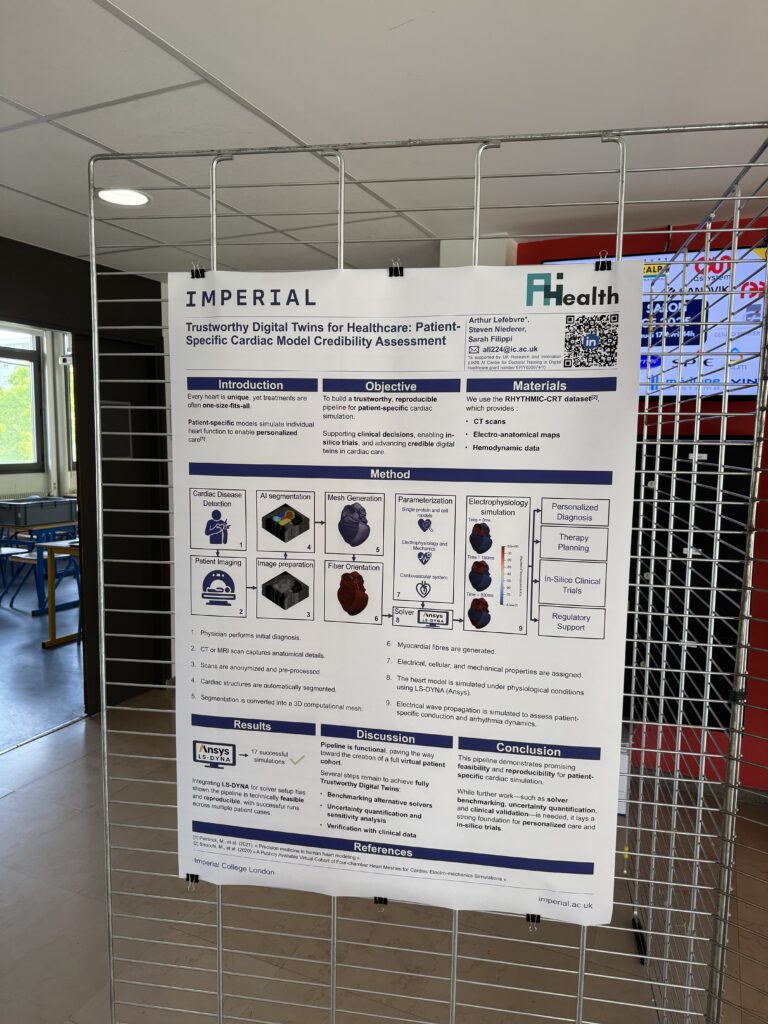
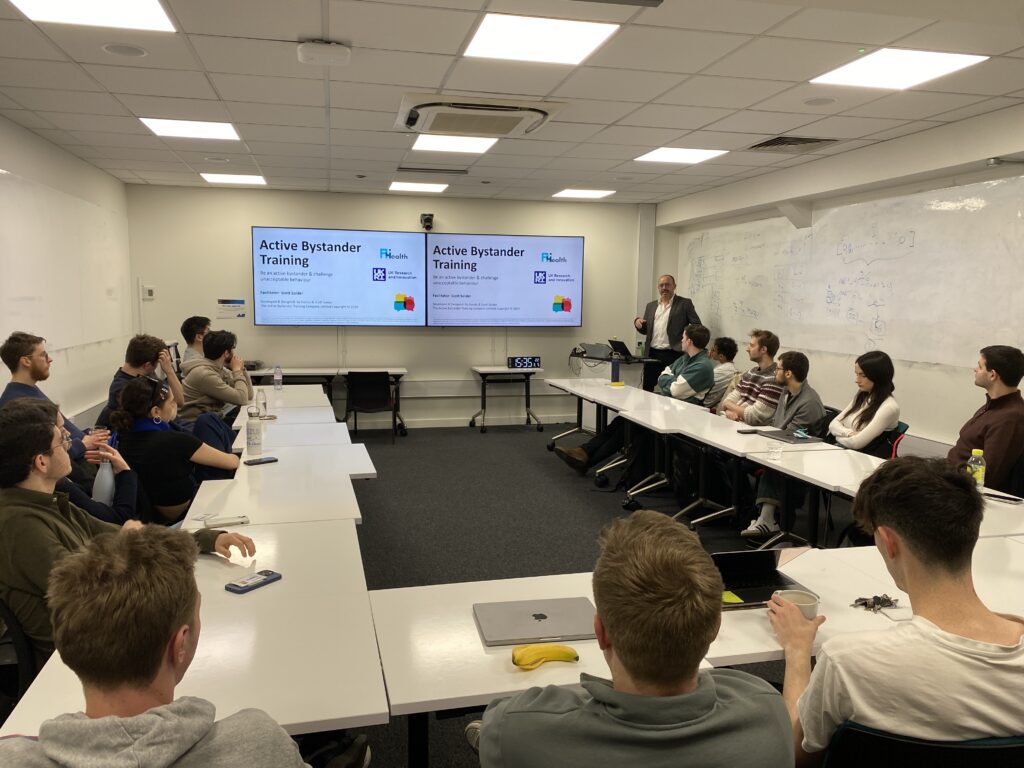
This March 2025, our #AI4Health Cohorts participated in the Active Bystander Training, reinforcing our commitment to fostering a positive, respectful, & inclusive culture across our Centre and networks. From supervisors to professional staff and students, everyone is leading by example, promoting the idea that a diverse and inclusive culture is essential to becoming better (AI) researchers, leaders and innovators. A big thank you The Active Bystander Company for delivering an engaging experience. #speakup
Congratulations to Alex Jenkins & Team on the recent pre-print, exploring how AI can map the human heart! Current treatment of Atrial Fibrillation with catheter ablation is one-size-fits-all. Here we develop ‘imputation mapping’ (FibMap), an AI approach that transforms routinely collected sparse measurements. Read the story here: lnkd.in/ezufCi7v
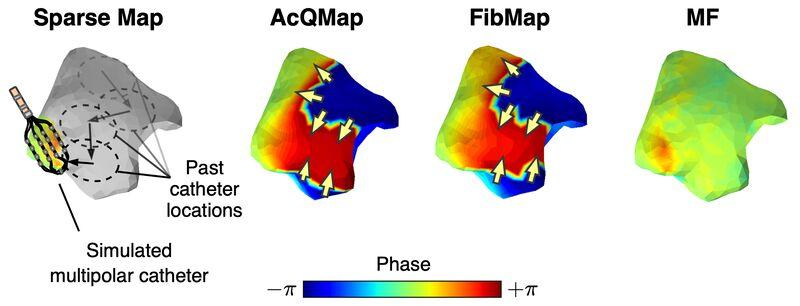
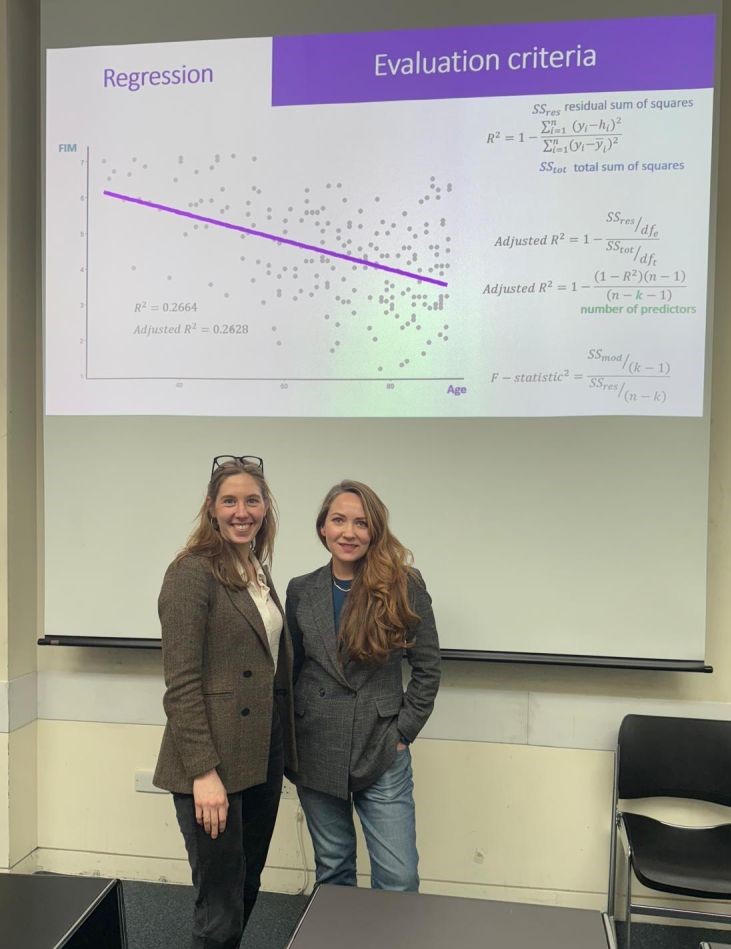
In February 2025, #AI4Health researcher Lucille Cazenave & Team led a teaching workshop on Research Methods & Applied Statistics to the students of the Human and Biological Robotics Master of Science, Imperial College London; Lucille shared that “It was such a great teaching experience, where we went through both theoretical content and a hands-on tutorial.” Amazing work.
https://www.linkedin.com/feed/update/urn:li:activity:7297535287772012544
Congratulations, Simon Hanassab & Team, on your Nature Communications publication. The study has been the first to analyse a large dataset to show that AI can identify specific ovarian follicle sizes that are most likely to yield mature eggs more precisely than current methods. The findings can lead to a breakthrough, transforming clinical decision-making for couples on their journey to overcome infertility. To learn more, go here: https://www.nature.com/articles/s41467-024-55301-y
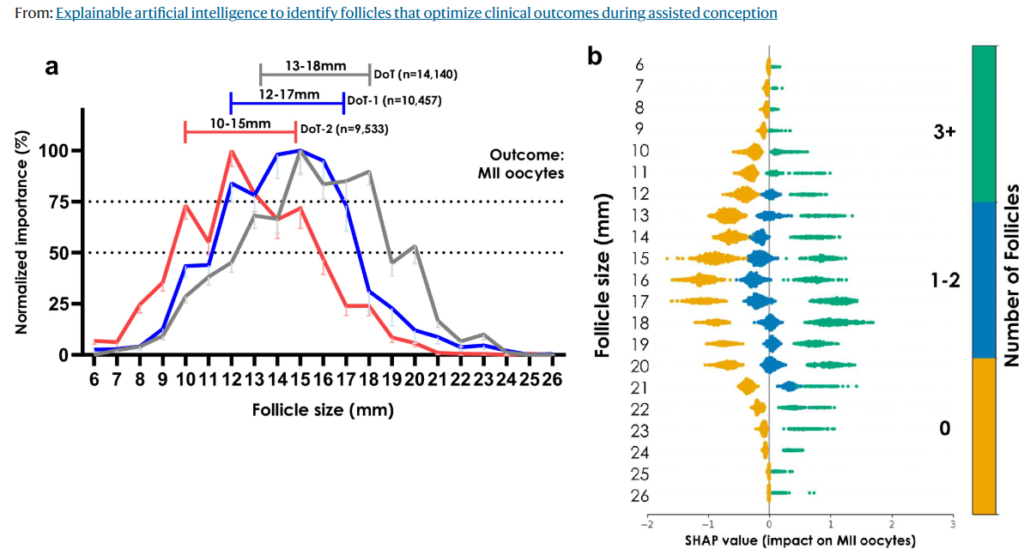
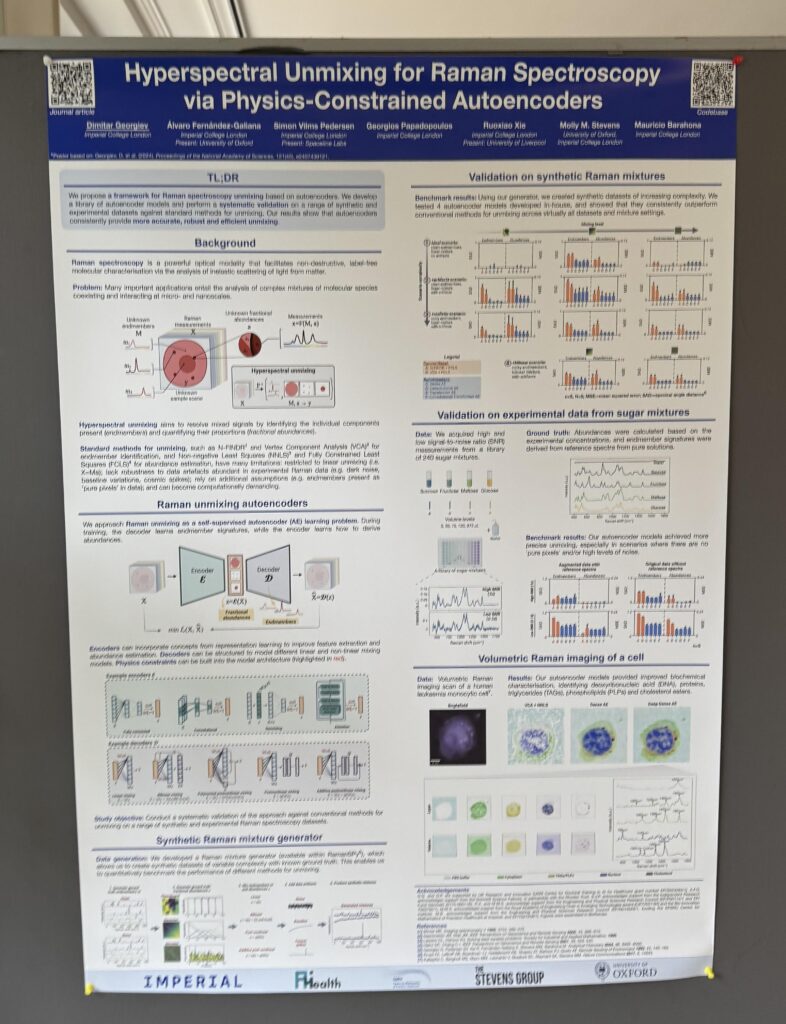
Congratulations to Dimitar Georgiev (2021 Cohort) on being accepted for presentation at the RAMAN RamanFest November 2024. His topic on Hyperspectral Unmixing for Raman Spectroscopy via Physics-Constrained Autoencoders generated a lot of interest because it demonstrates a significant advancement in the field of Raman spectroscopy through the integration of AI. Furthermore, his work received the Best Poster Award (which is the only award issued each year by this conference). Nov 2024
Alex Ranne presented his work at the IEEE/RSJ international conference on intelligent robots and systems IROS 2024. Title: “CathFlow: Self-Supervised Segmentation of Catheters in Interventional Ultrasound Using Optical Flow and Transformers”. This is work on transformers for temporal aware segmentation of endovascular catheters in ultrasound. They made the architecture self-supervised (no longer needing labeled images) which are costly to prepare. With this system, we see a future where AI assisted Ultrasound guidance may become a new paradigm for non-fluoroscopic surgery; this is developed in collaboration with the Hamlyn Centre for Robotic Surgery. Oct 2024
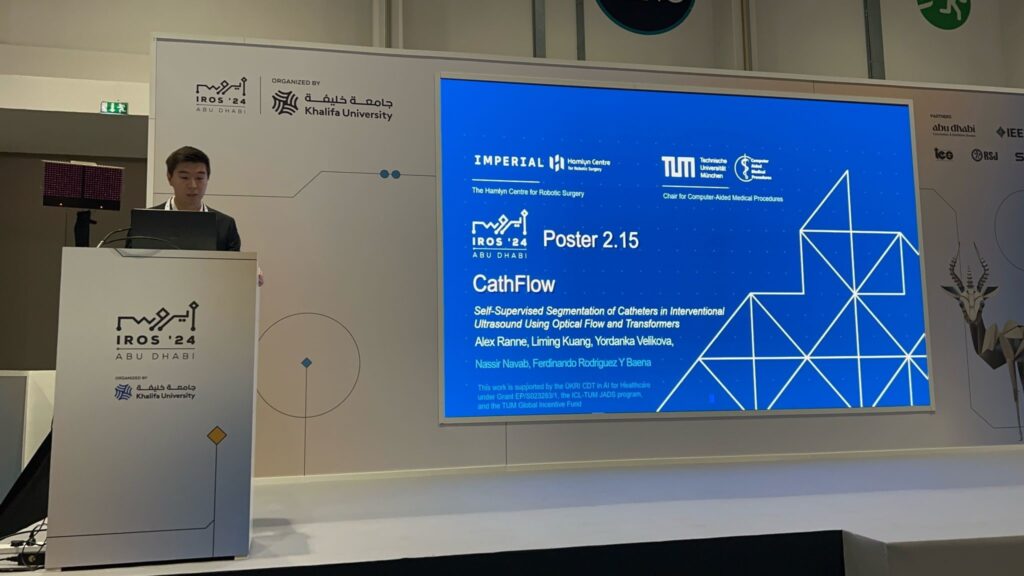
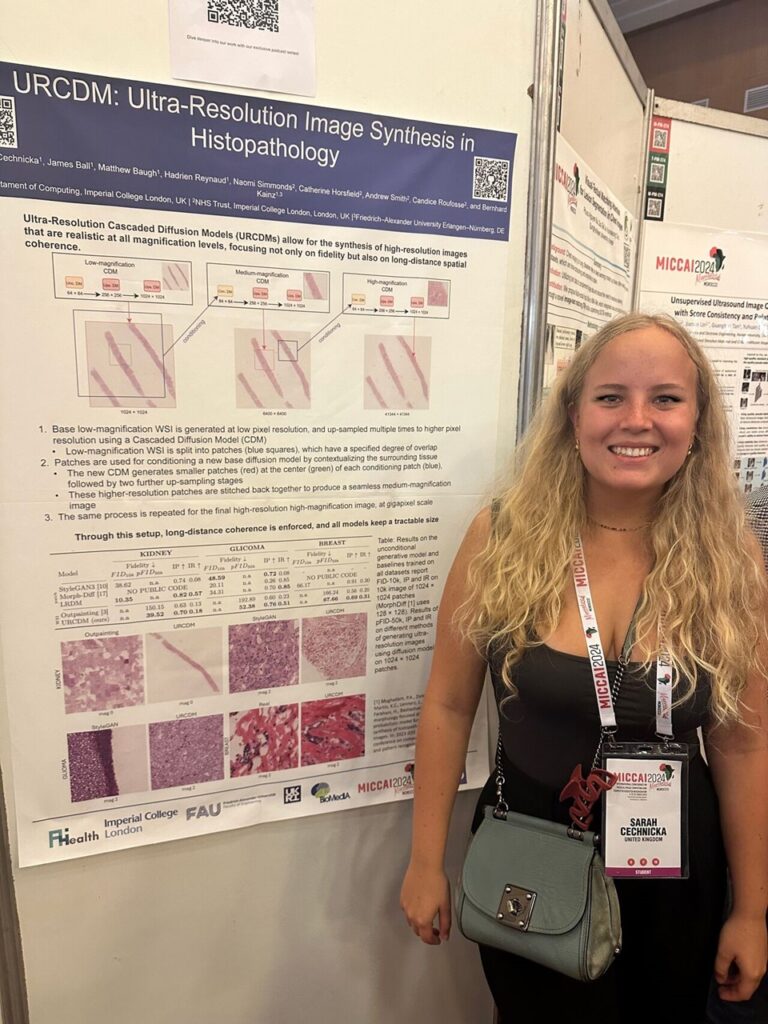
Proud of Sarah Cechnicka who was invited to present her work on Ultra-Resolution Image Synthesis in Histopathology (URCDM) at #MICCAI2024. What is URCDM about? She and her team developed a method that can generate entire histopathology slides at ultra-high resolution, capturing realistic details across multiple magnifications (think 41,344 x 41,344 pixels!). This approach mirrors how pathologists analyse tissue at different zoom levels and has the potential to transform how we train machine learning models for medical imaging. And Why does it matters: Because their method not only creates synthetic images that look indistinguishable from the real thing (as validated by expert pathologists!), but it also respects patient privacy by allowing image publishing without real data. This could unlock broader data sharing and collaboration in medical imaging. Oct 2024
Excited for Weitong Zhang who was invited to present his work at the MICCAI 24 workshop on MRI Super-Resolution Reconstruction in the Wild: Physics-informed Unsupervised Test-time Adaptation for MRI Super-Resolution (UTAR). MRI super-resolution reconstruction (SRR) models often fail in new domains due to distribution shifts and simplified degradation models. Our UTAR framework addresses these challenges using physics-informed modeling and unsupervised test-time adaptation (TTA), allowing SRR models to adapt robustly to unseen clinical environments without requiring re-training or access to source data. Oct 2024
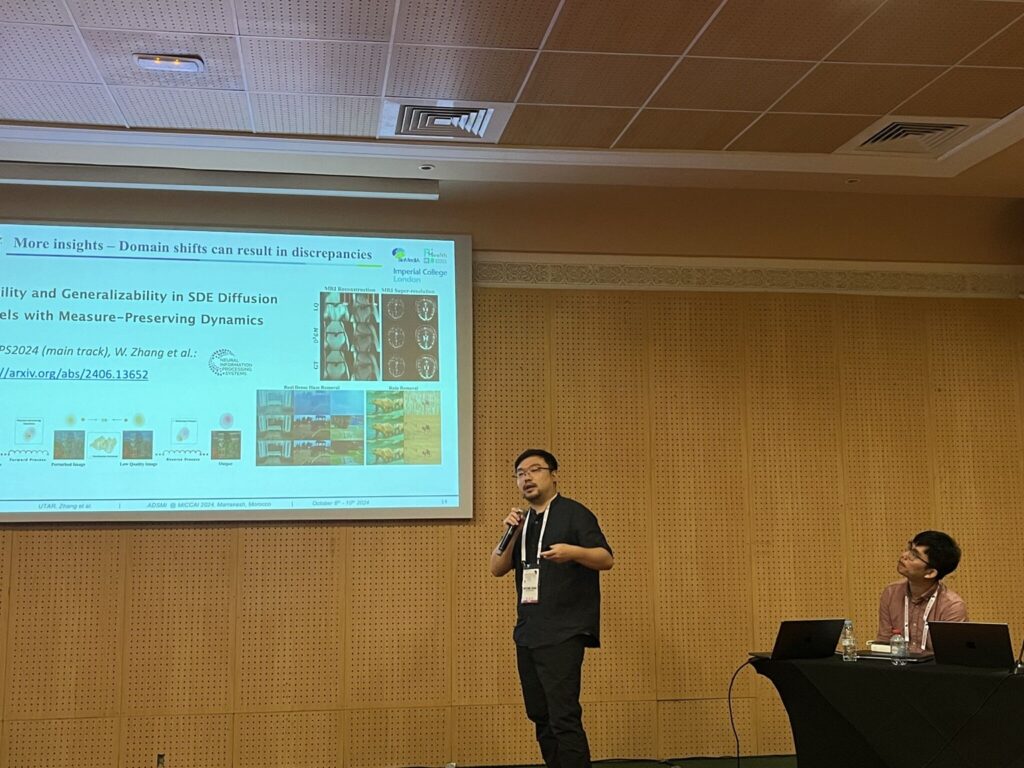
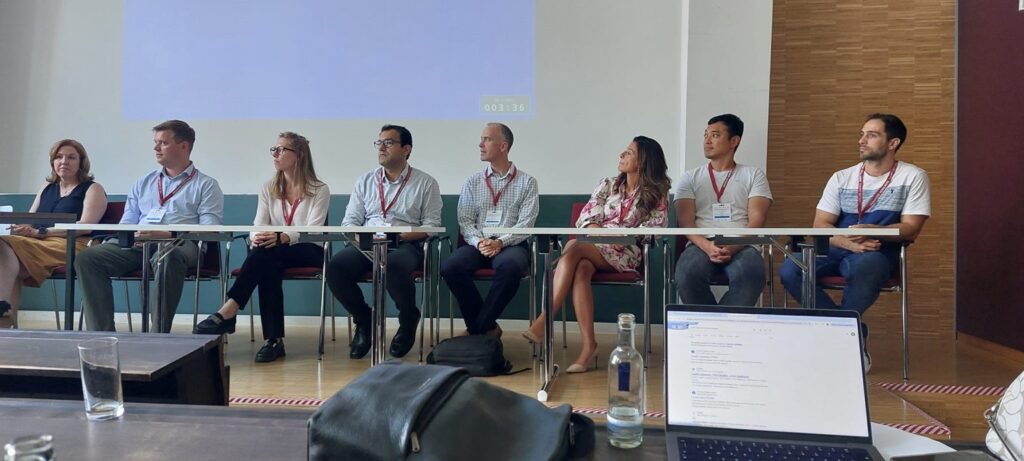
Congratulations to Lucille Cazenave (third from the left in photo) who was invited to present her work at BioRob 2024 in Germany. She talked about hybrid systems combining robotics and functional electrical stimulation for applications in assistance for spinal cord injury patients and rehabilitation of stroke patients. The session finished with a panel discussion which explored the challenges of using these new technologies and new research avenues. This workshop provided a stimulating opportunity to network with well-known scientists in this field. Other aspects of the conference covered topics such as the development and evaluation of robotic systems for different medical applications. Sep 2024
Aizaan Anwar (fifth from left on photo) participated in the InterSpeech 2024 Conference. The conference provided latest insights about pitfalls in pathological speech analysis and methodological framework for performing my own research (from data acquisition, hardware considerations, feature validation, to statistical analysis, ML modelling, ethics and deployment which made the understanding of speech analytics in healthcare or digital biomarkers extremely beneficial. Sep 2024
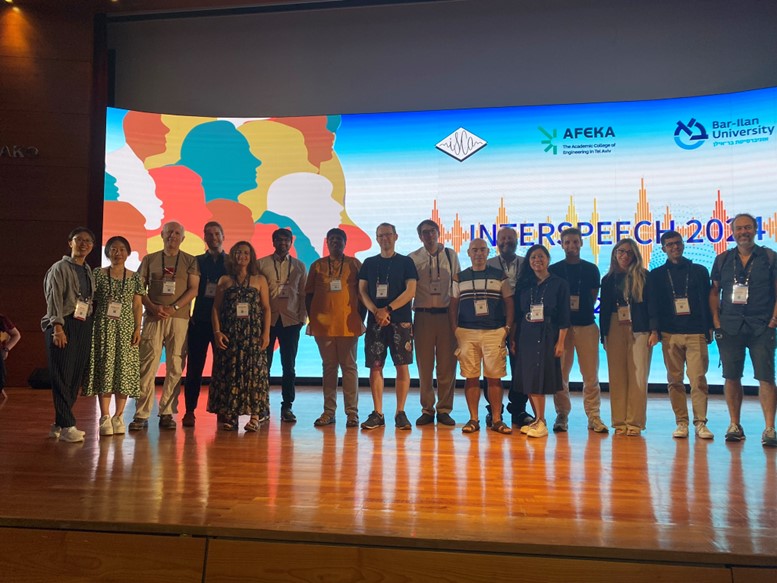
Ruoyu Hu (2022 Cohort) was invited to present his poster at the Association for Computational Linguistics (ACL) 2024 Workshop ConvAI. “Exploring Description-Augmented Dataless Intent Classification”. Some of the ideas discussed, including potential solutions to some issues with safety guarantees and LLM protocol-following were points to take back and to explore for further research. Aug 2024
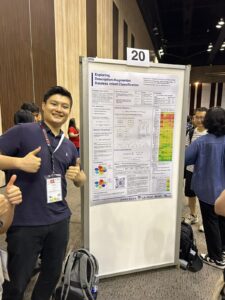
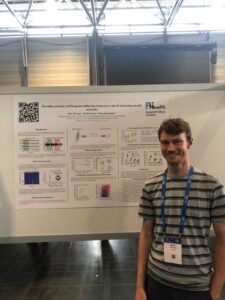
The Federation of European Neuroscience (FENS) 2024 was a very important forum to attend for Mike Thornton because it provided a unique opportunity to connect with fellow researchers who work in neuroscience and AI. Mike showcased his work entitled “Decoding envelope and frequency-following responses to speech using Deep Neural Networks”, work that is happening at the intersection of neuroscience and AI. This research aims to develop smarter, neuro-steered hearing aids that enable people who use hearing aids to better understand speech in noisy environments. If the focus of a listener’s attention could be detected, smart hearing aids could amplify the attended speaker and suppress other sounds. Jun 2024
Dimitar Georgiev (Cohort 3) attended the “ML for Drug Discovery Summer School” in Montreal. The ML for Drug Discovery Summer School was packed with insightful talks and hands-on labs led by renowned scientists such as Prof. Yoshua Bengio, Prof. Michael Bronstein, and Prof. Anne E. Carpenter. The sessions covered a wide range of topics in molecular machine learning, including molecular screening and design, molecular property prediction, molecular dynamics simulations. Dimitar thought it was fantastic to see how AI technologies are moving beyond methodological work on ‘toy’ benchmark datasets and are now being routinely applied in wet labs in close collaboration with biologists, chemists, and other field experts. This approach is already gaining significant traction, with numerous success stories showcasing the transformative impact that multidisciplinary research can have on future drug discovery pipelines. Jun 2024
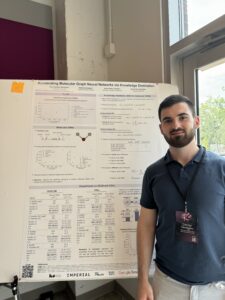
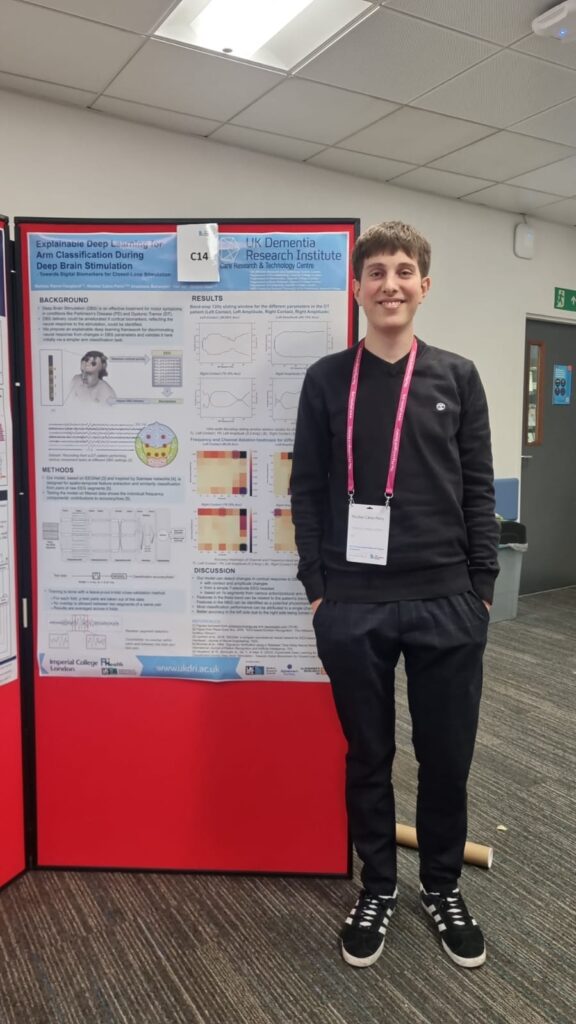
Nicolas Calvo Peiro (Cohort 5) just started his PhD in October 2023 and had already a poster accepted to his first conference, at Neural Basis of Human Movement (NBHM). Title: “Explainable Deep Learning for Localizing Cortical Physiomarkers from Deep Brain Stimulation.” He got insight into key innovations in the field of movement neuroscience, received lots of interest and positive feedback on his work, as well as inspiration for a publication. Great work. Dec 2023
Simon Hanassab’s abstract was accepted for presentation at #ASRM2023, looking at a data-driven #ML answer to triggering criteria in IVF cycles. Which follicle sizes contribute most towards mature oocytes (MIIs) and blastocysts? Title of the abstract: “Optimising Oocyte Yield: Unveiling the ideal follicle sizes on the day of trigger using interpretable machine learning”. Oct 2023
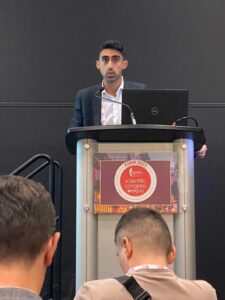
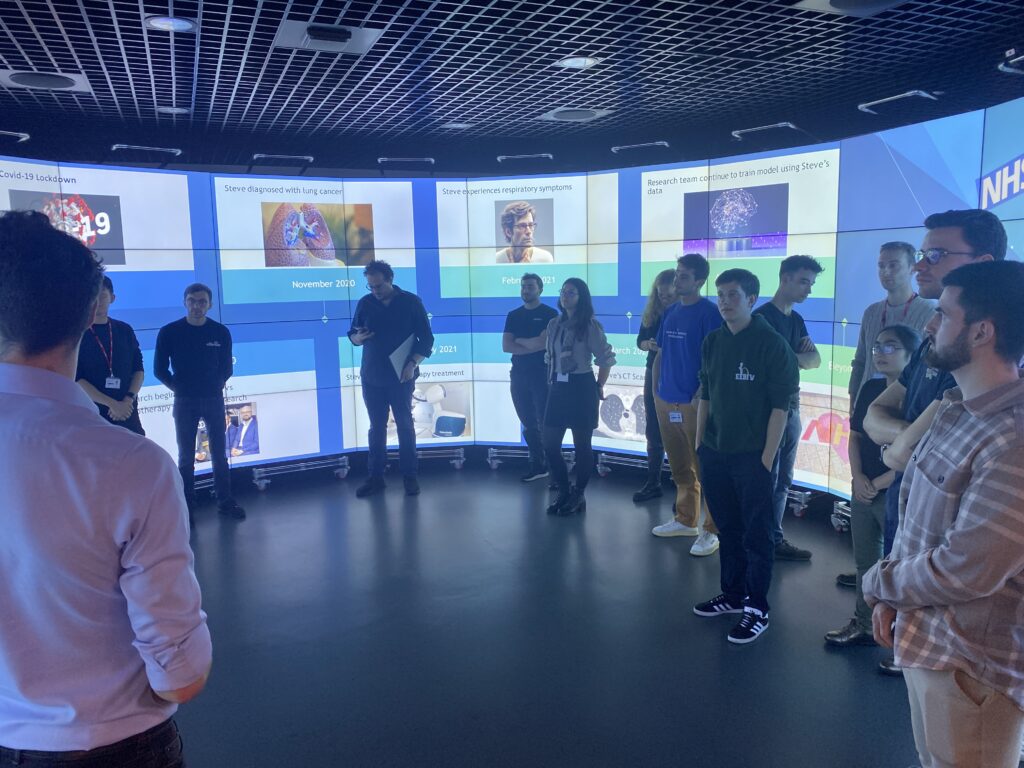
Our new Cohort 5 showcased demos. Great to see their creative presentations and fresh perspectives on #AI4Health brought to the table! Oct 2023
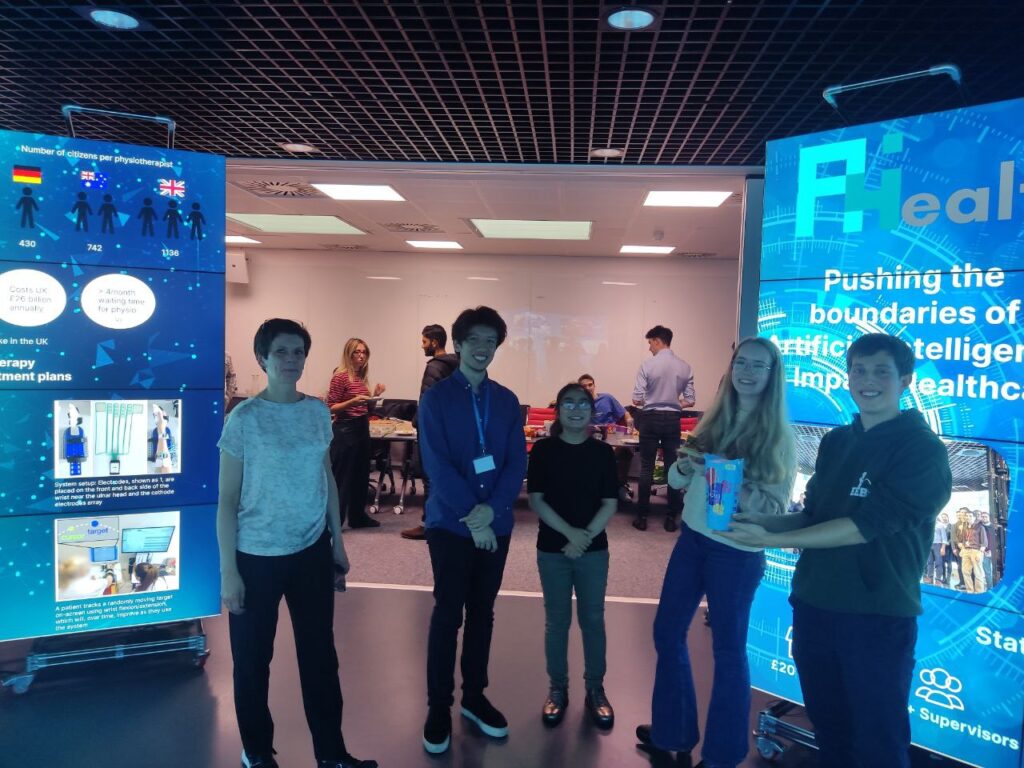
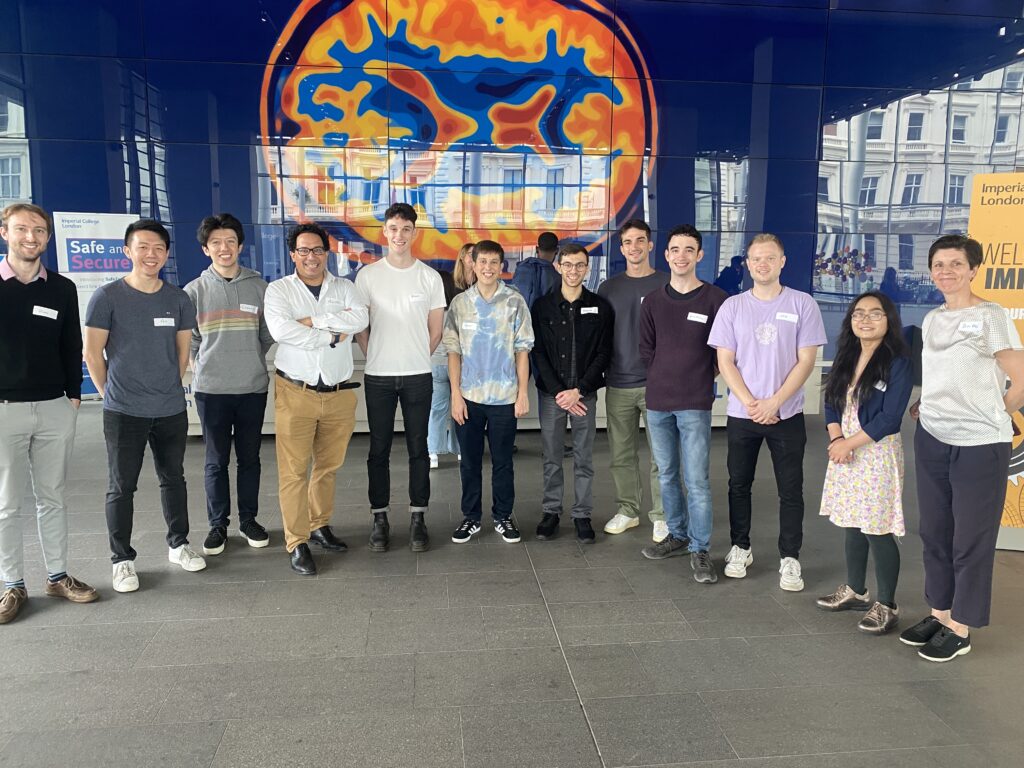
Welcoming our new Cohort starting their AI for Health PhD October 2023. The exciting journey of advancing AI in health and patient care begins. #UKRI #ai4health #leaders #innovate
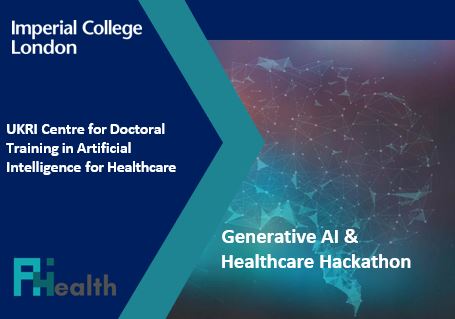
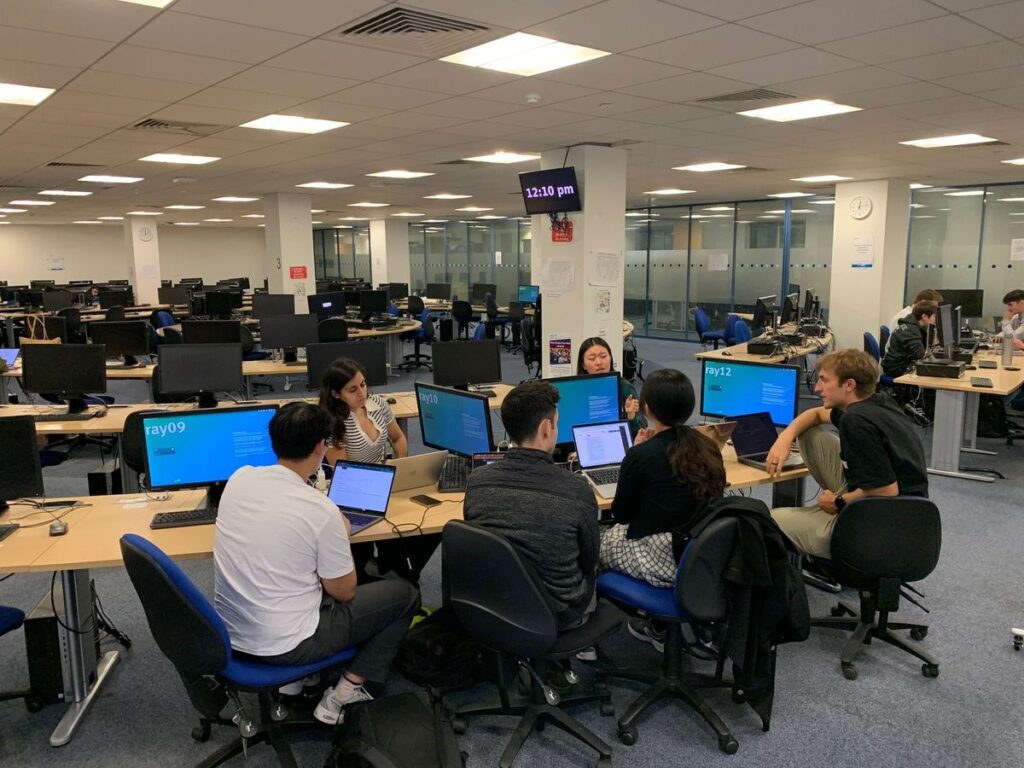
Our Centre hosted the successful Generative AI x Healthcare Hackathon. The primary goal of the Hackathon was to foster collaboration across various sectors of the #HealthTech industry, bringing together teams with diverse expertise, including medical professionals, data scientists, software developers, user experience designers, and regulatory experts. Sep 2023
Professor Aldo Faisal, Director of the UKRI Centre in AI for Healthcare, expressed gratitude to the sponsors and participants, saying, “We were delighted that the centre’s support could catalyse our resources by our amazing partners, and we look forward to seeing how the technologies created here continue to develop”.
Exciting update: Congrats, Federico Nardi -Cohort 3- on presenting his work on ‘Bill-EVR: an Embodied Virtual Reality framework for reward-and-error-based motor rehab-learning‘, pushing boundaries of motor learning and rehabilitation through innovative technology. September 2023. #RehabWeek2023
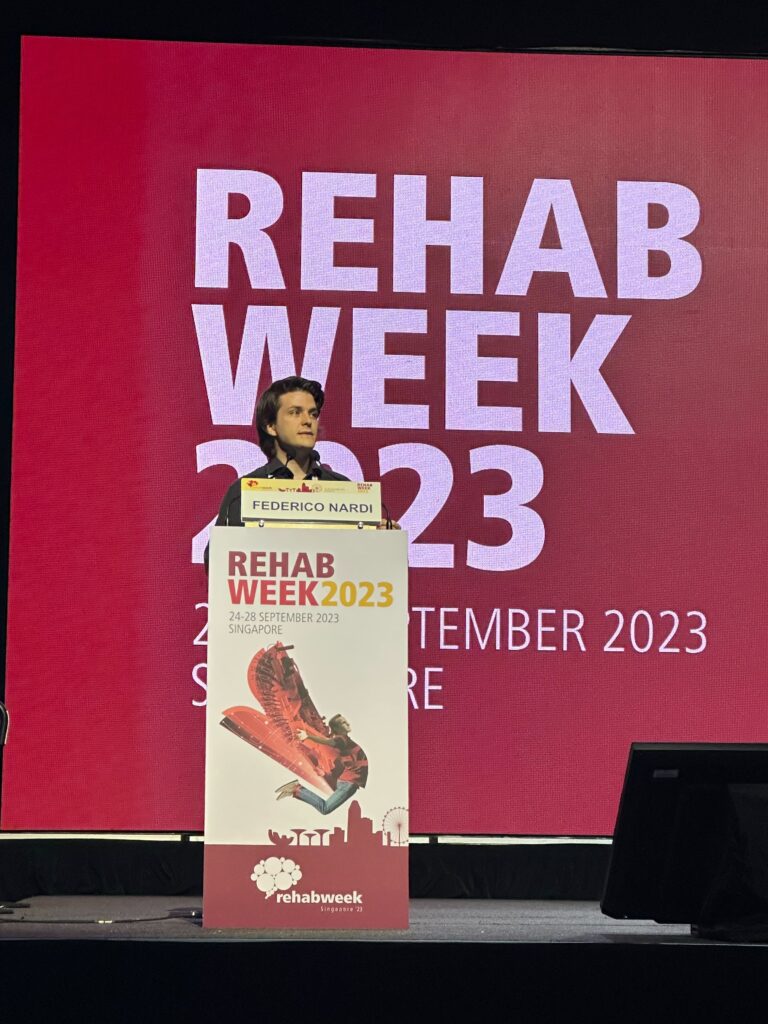
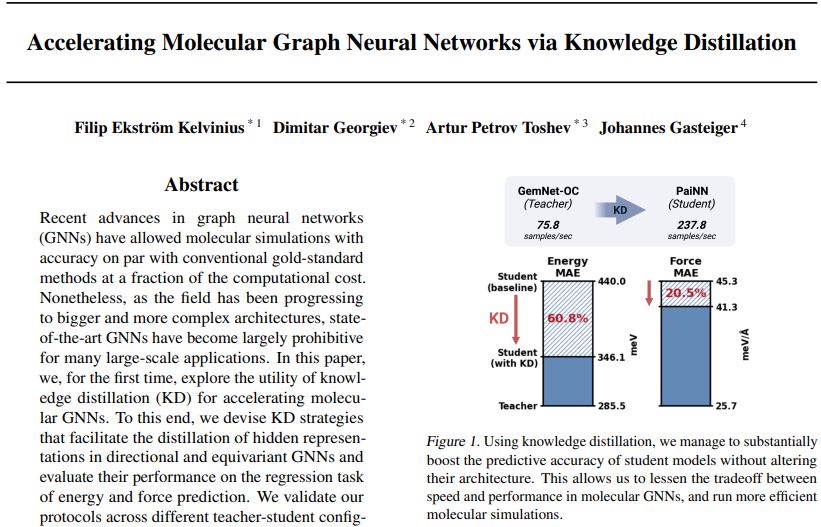
Congratulations also to Dimitar Georgiev who with his team presented their work “Accelerating Molecular Graph Neural Networks via Knowledge Distillation” at the ICML 2023 Workshop ‘Synergy of Scientific and Machine Learning Modeling.’ The goal of the workshop is to bring together ML researchers and domain experts working on augmenting their scientific models with machine learning, and researchers looking for opportunities to incorporate ML in widely-used scientific models. July 2023
Come and find our Exhibit stand at #ICML 2023 and chat to our brilliant #AI4Health researchers about their prelims and ideas @PFestor @alj_jenkins @joshsouthern Edison Liu, Giannis Afentakis, @AnalogAldo . July 2023
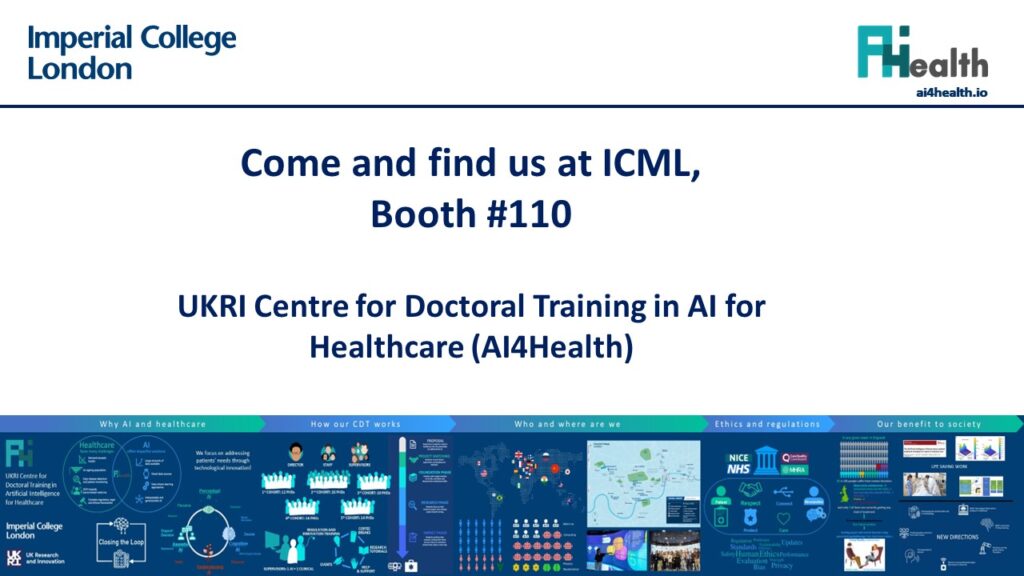

Giulia -Cohort 4- just started her PhD in October 2022, and was accepted to present her work at the #ACL2023 conference. An important step for her career and a great occasion to meet new colleagues working on NLP all over the world. July 2023. Check out her paper here: https://aclanthology.org/2023.clinicalnlp-1.24/
Cosima -Cohort 4- at one of her first presentations at a major conference, NCM-Neural Control of Movement in Canada. Cosima was invited to present her research on “Cortical beta bursts from forearm motor unit spiking activity”. This research is of particular interest in Parkison’s Disease because they have potential to be used as markers for therapy efficacy, for closed-loop deep brain stimulation therapy. Very interesting work. May 2023
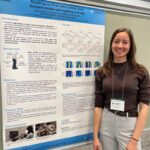
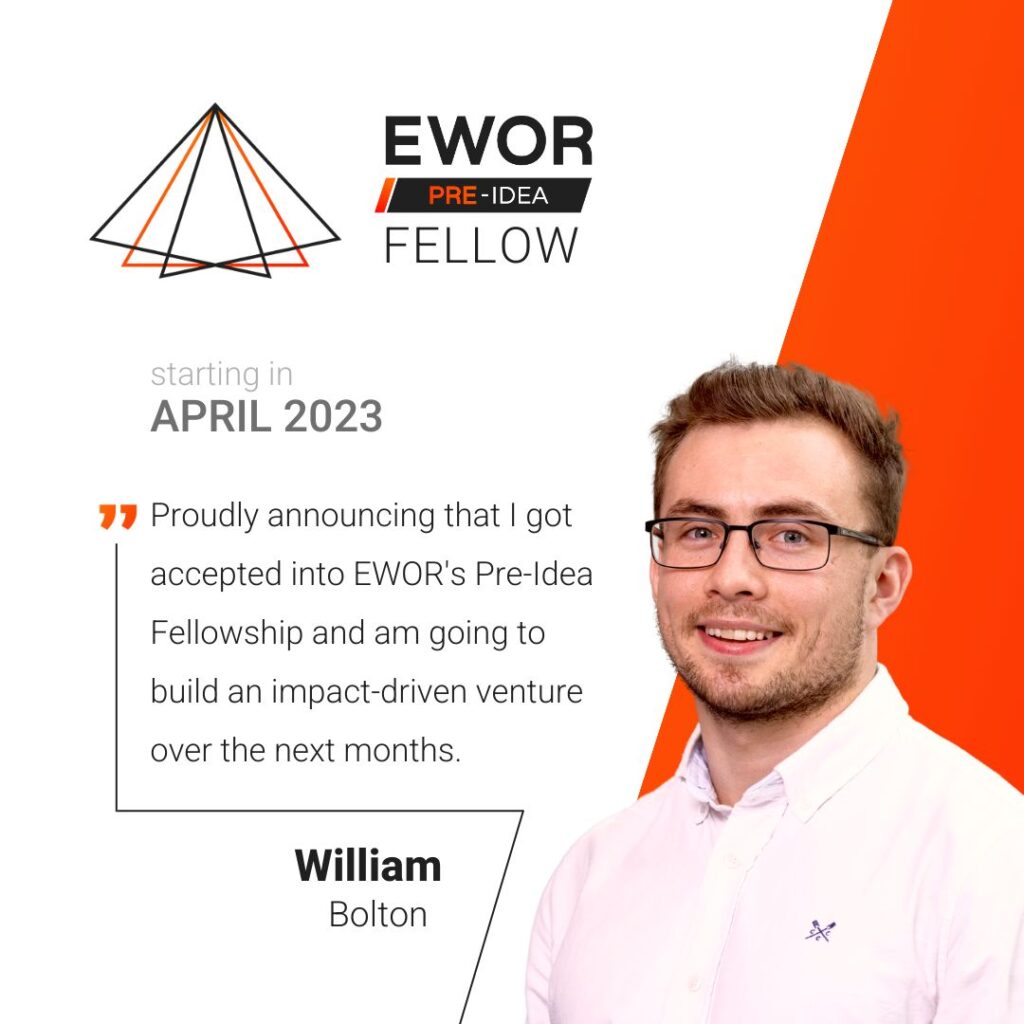
Exciting news: Congratulations to Will Bolton -Cohort 2- who was accepted as #EWOR Fellow into the EWOR and Conception X Pre-Idea Cohort. He aims to create and build a technology venture that will impact healthcare for the better. We cannot wait to see what ides come up during his venture fellowship. April 2023
Lucille Cazenave’s -Cohort 3- project obtained ethics approval to deploy my rehabilitation system from the lab to the clinical environment. This video showcases a clinician testing the training protocol which the researcher has developed for stroke patients’ rehabilitation; it combines robotic assistance as well as muscle stimulation. Before starting a clinical study, feedback from clinicians and therapists on the device and on interface was collected to tailor it to post-stroke patients. March 2023
This image showcases a stroke patient training their forearm motion with the rehabilitation device PhD Researcher Lucille Cazenave & Team developed to assists them with robotic force and muscle stimulation. These devices are currently used in a clinical study in Germany; and initial feedback on the system has been very positive. March 2023 #rehabilitation #FES #stroke #sensorimotor
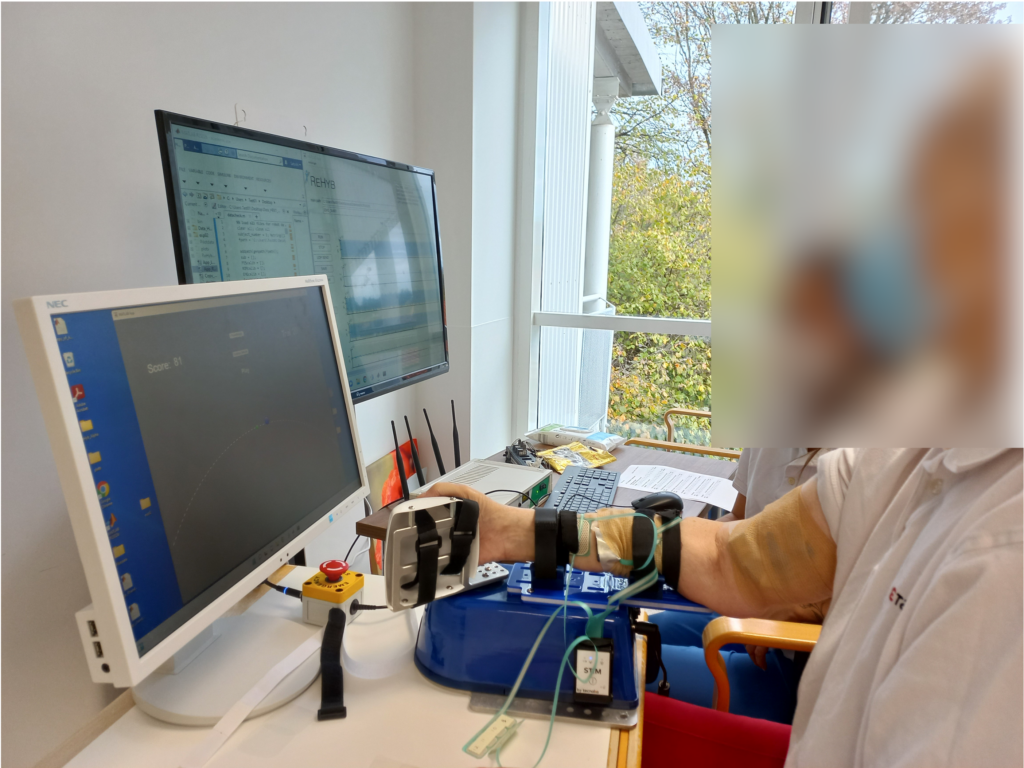
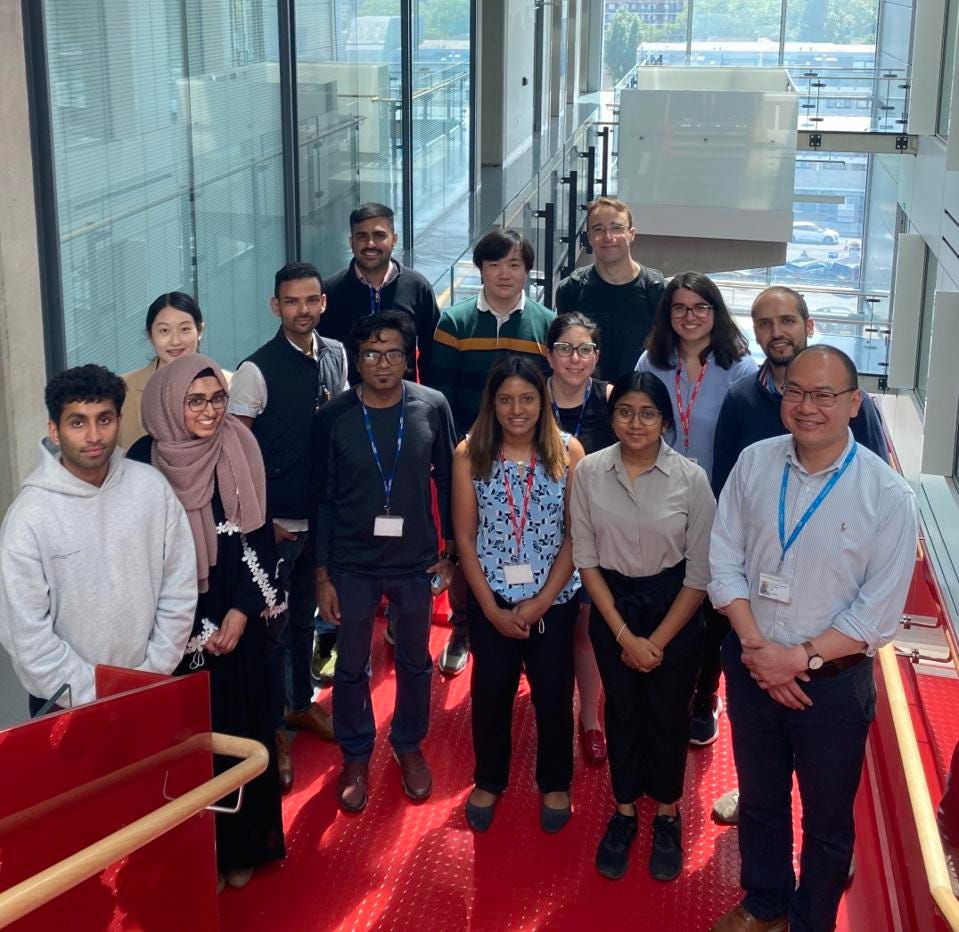
Look at this fantastic example of multidisciplinary research to develop AI technology to solve problems in cardiology. #AI4Health PhD researcher Alex Jenkins -Cohort 3- @alj_jenkins‘ is part of the @DrFuSiongNg Lab as a physicist, applying AI methods to improve mapping of atrial fibrillation. Congratulations on being featured @Forbes Magazine. March 2023
Alex Jenkins presented his research on AI-based tools to personalise Patient treatment for Atrial Fibrillation at AAAI 2023; He received valuable feedback from leaders in industry and academia. One presentation on spectral entropy maximisation for reconstruction of missing data on graphs inspired ideas on broadening approaches to using methods. Congratulations on being accepted by the conference. Feb 2023
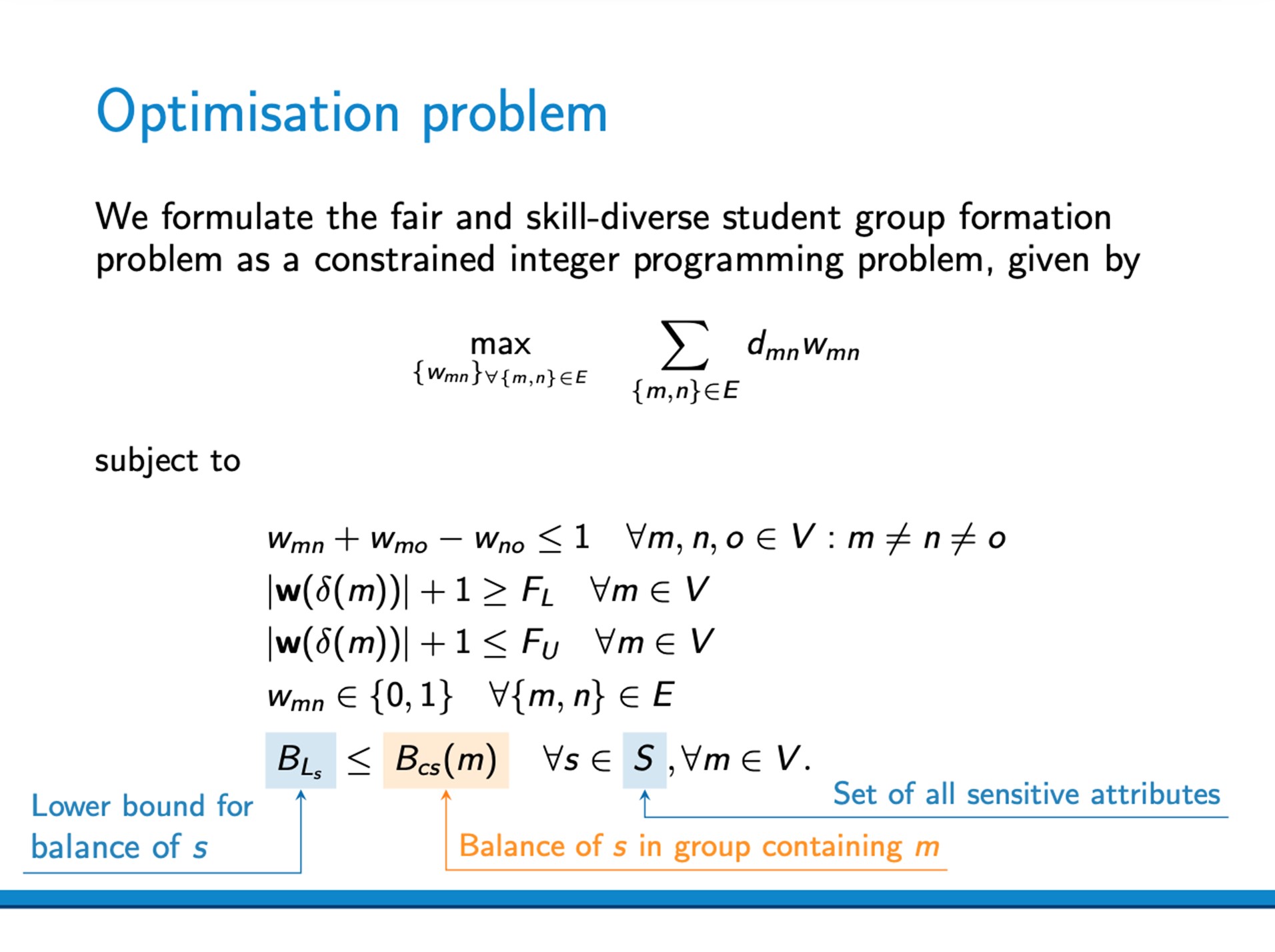
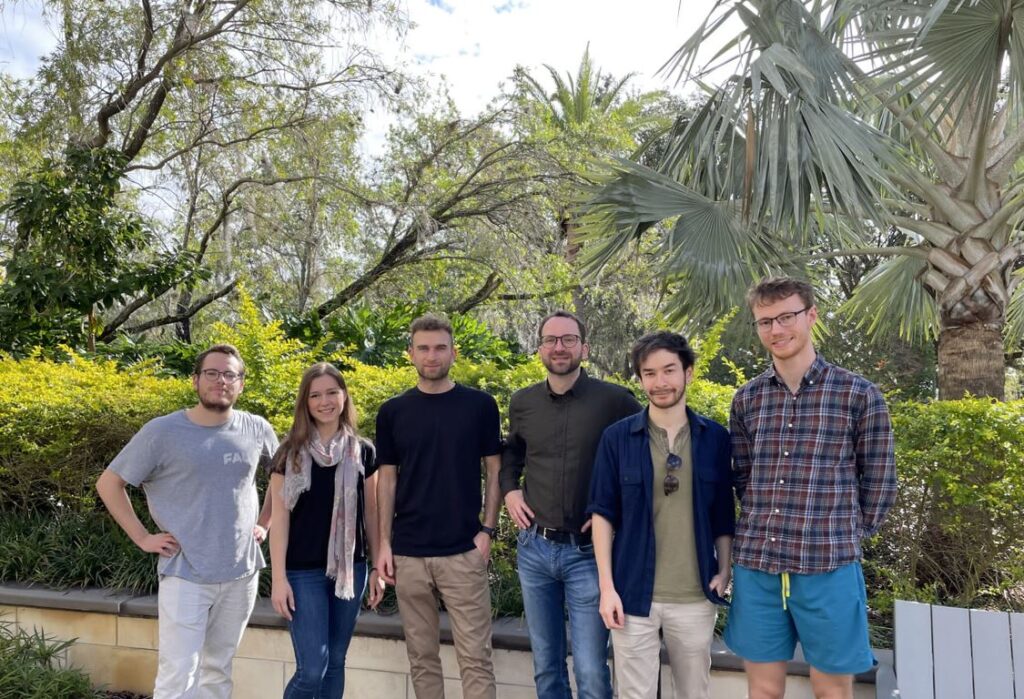
Mike Thornton (right) presented his work at the ARO meeting Orlando, USA. This annual conference brings together the entire auditory neuroscience community. Mike was particularly interested in some of the work originating from MIT Lincoln Labs: researchers there are pursuing a novel auditory decoding approach whereby they relate speech-evoked neuroimaging data to the intermediate activations of deep speech-processing neural networks. Feb 2023
Many congratulations to our Clinical Fellow Sumeet Hindocha, MD, @shindocha87 on passing their AI PhD and achieving the ‘Double-Doc’! Sumeet is one of the first clinical fellows to complete the PhD. Three years have flown by. Feb 2023. Thesis title: The Investigation of Machine Learning and Radiomics Methods for the Prognostication of Recurrence and Death following Curative Intent Radiotherapy for Non-Small Cell Lung Cancer. Feb 2023.
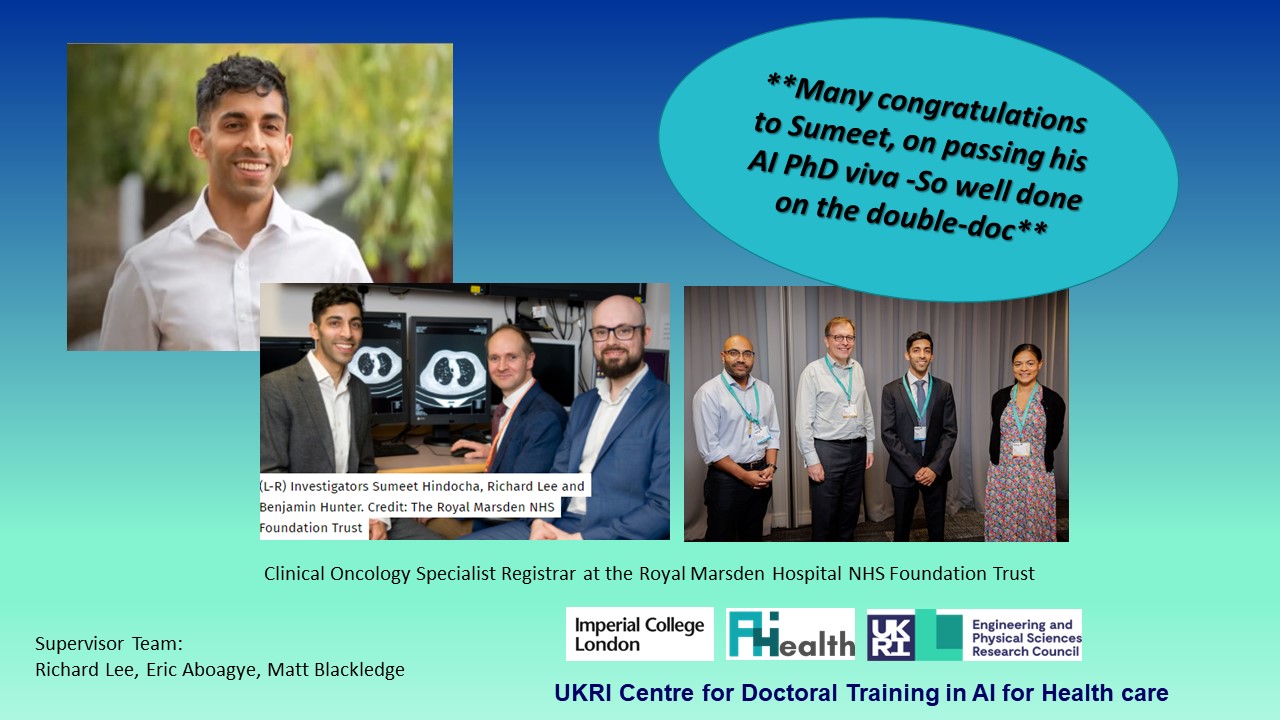
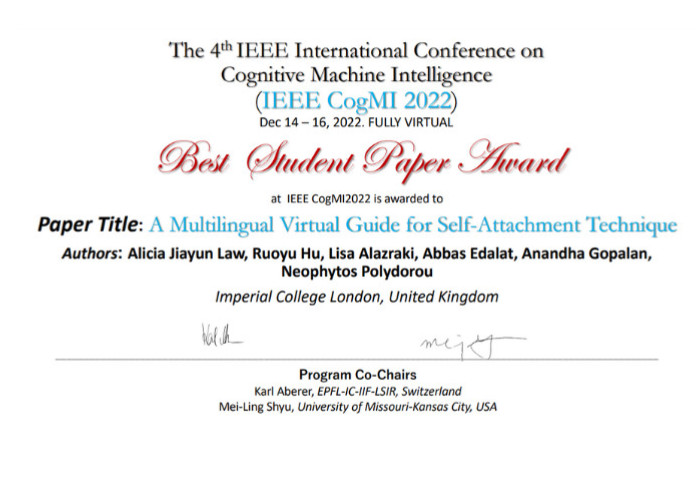
Congratulations to the team around #AI4Health PhD researchers Ruoyu Hu and Neophytos Polydorou who were awarded Best Student Paper at the Fourth IEEE International Conference on Cognitive Machine Intelligence. Their paper “A Multilingual Virtual Guide for Self-Attachment Technique” describes a novel computational framework for deploying digital psychotherapy guides for Self-Attachment Technique. Dec 2022
Sumeet Hindocha @shindocha87, oncology specialist and clinical fellow, had his latest research paper featured in The Times. Thanking all of the team, he explained that they are one step closer to personalised, risk-stratified surveillance after radiotherapy treatment for lung cancer. While at a very early stage, this work suggests that the AI model could be better at correctly predicting tumour regrowth than traditional methods. This means that, using his AI technology, clinicians may eventually be able to identify recurrence of lung cancer earlier in high-risk patients. Dec 2022
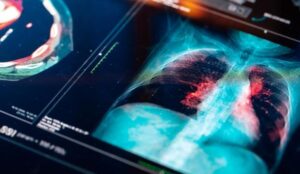
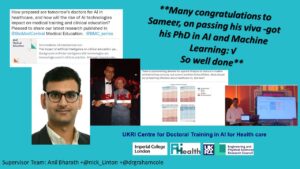
Massive congratulations to Sameer Zaman, MD, on passing the PhD viva. December 14, 2022. Sameer is the first clinical fellow in our CDT finishing his #AI4Health PhD, in just three years. Super. Trailblazing. PhD project titled Machine learning applications for the acquisition, analysis and reporting of cardiovascular magnetic resonance imaging. Dec 2022
Every year the Imperial College Robotics Forum hosts an annual competition with Amazon to reward the great work of our PhD students. And Lucille Cazenave was one of the 2022 winners, with her project AI Therapist: Personalised Data Driven Hybrid Neurorehabilitation. Congratulations and well done. Dec 2022
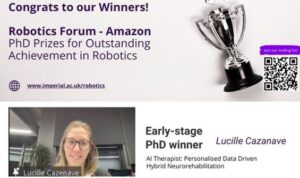
Training in RRI – Responsible Research & Innovation at our AI4Health Centre
This July 2022, our Centre ran the 2nd edition of its Regulation & Innovation training course. This is our bespoke training course on how medical device regulations work in the context of AI and how innovators can navigate the healthcare ecosystem. Speakers included Dr Warren Macdonald from @ImperialBioeng, who covered a solid introduction to how the regulatory processes work; Mateo Rojas from LakeraAI, who explained why some AI systems could still fail despite seemingly being SoTA, and how innovators can build production-ready AI with focus on safety; and Dr Hugh Harvey from @HardianHealth who had a fantastic discussion with our students on how the regulatory process applies to AI. We further discussed why defining the intended use is so important & how the industry can potentially adopt transparent AI standards.
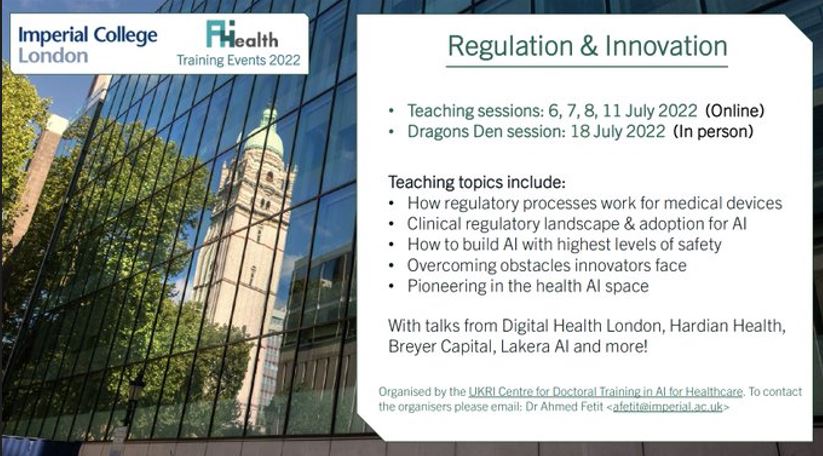
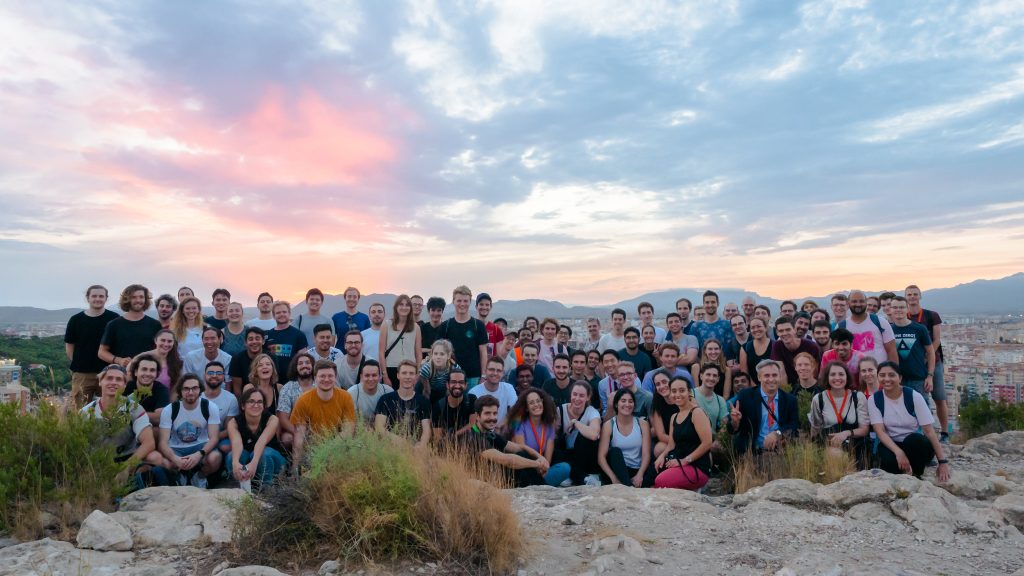
Ruby Sedgwick participated in the The ELLIS Alicante PhD symposium which brought together 170 machine learning early career researchers from across Europe. The popular poster sessions showcased current research in machine learning. Ruby presented her work to other researchers and discussed work on sparse Gaussian processes, latent variable models, and fairness in AI. Aug 2022
Paul Festor presented his research at a conference hosted by the University of York in partnership with NHS Digital mainly for clinicians and also those working in healthcare IT and clinical risk management. The aim was to present different perspectives on the introduction and safety of AI and autonomous systems in healthcare. He explained his research on the safety assessment of the AI clinician for sepsis treatment, with the approach of This is the recording of the presentation. July 2022
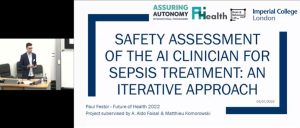
CAI4H 2022 – UKRI AI CDTs in Healthcare Conference
In May 2022, the four UKRI AI CDTs doing research in health came together at Britain’s first UKRI AI CDTs in Healthcare Conference. This conference aimed to promote scientific exchange between doctoral students across the UK and strengthen collaborative research in the wider area of AI for health. The participating UKRI Centres included
o CDT in AI-enabled Healthcare Systems at University College London, @cdt_ai_health
o CDT in AI for Medical Diagnosis and Care at Leeds University, @LeedsMedAI_CDT
o CDT in Biomedical AI at Edinburgh University, @BioMedAI_CDT
o CDT AI for Healthcare at Imperial College London, @AI4HealthCentre [also lead organiser]
The 2-day conference offered a varied programme, including a keynote presentation, poster presentations and spotlight talks of the top abstracts which had been selected by the conference panel.
It was a successful event. Everyone enjoyed the high scientific quality of the posters and talks, and are looking forward to the next joint conference of the UKRI AI CDTs in Health.
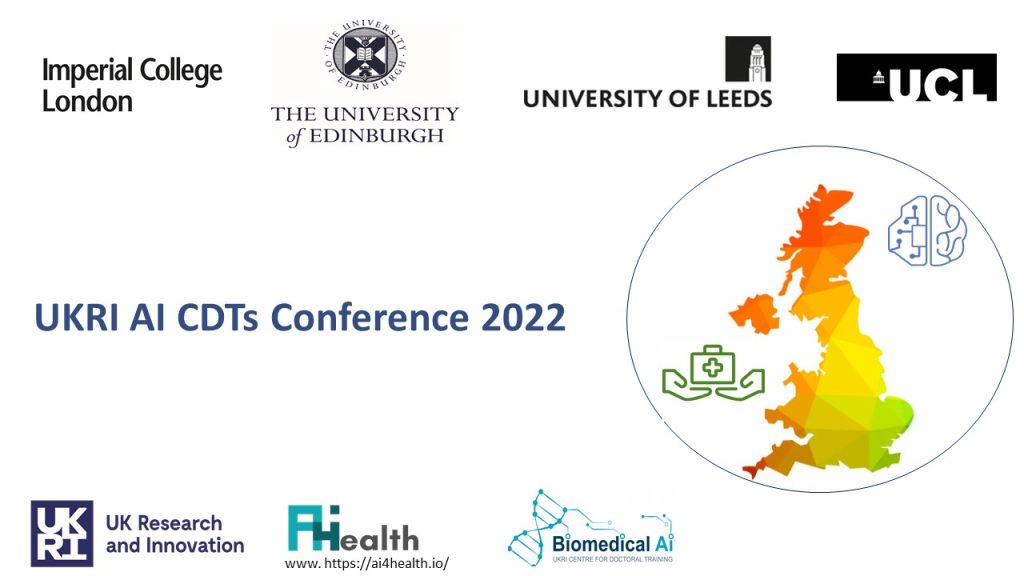
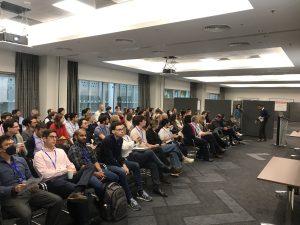
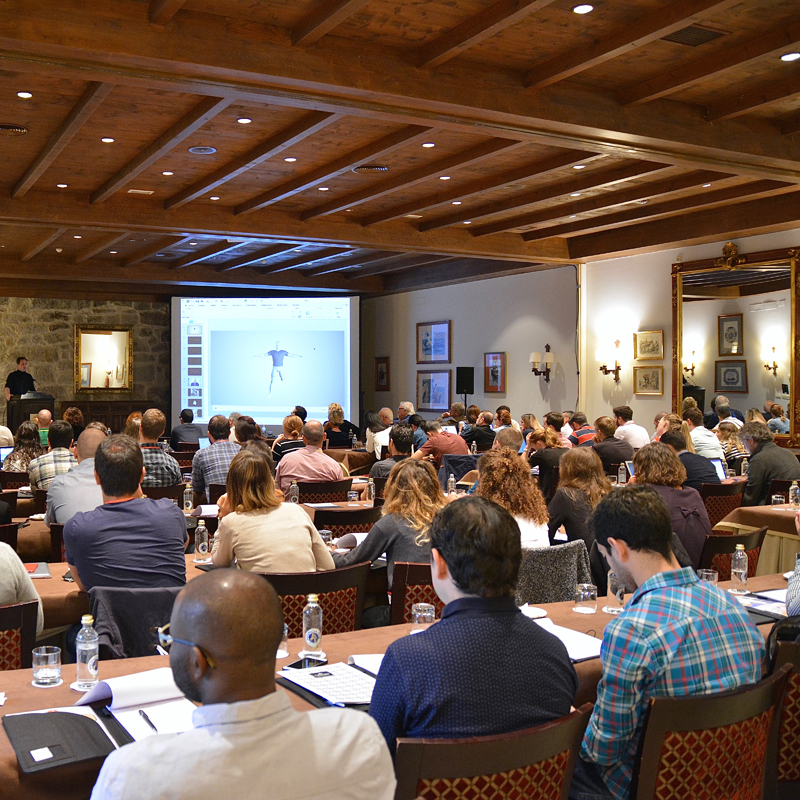
Agnese Grison participated in the SSNR-Summer School of Neurorehabilitation. This 5-day school was split into 3 main areas: Rehabilitation Robotics, Neuromodulation and Prosthetics. Keynote speakers included Arun Jayaraman-CEO of the he Technology & Innovation Hub (tiHUB), Natalie Mrachacz-Kersting- Albert-Ludwigs University Freiburg, Shingo Shimoda- RIKEN Center for Brain Science and more; the lectures were complimented by workshops, putting research into practice. Agnese thought it was fantastic to meet leaders of the Neurorehabilitation Engineering field and to network with fellow researchers from around the world. Jun 2022
Did you know that Digby Chappell presented two papers at the 2022 IEEE International Conference on Robotics and Automation (ICRA), reaching over 2000 attendees. One talk was on “Virtual reality pre-prosthetic hand training with physics simulation and robotic force interaction”, where a robot-enhanced virtual reality system was used to train participants to use a prosthetic hand. There was huge enthusiasm and interesting discussions about future research and collaboration opportunities. May 2022
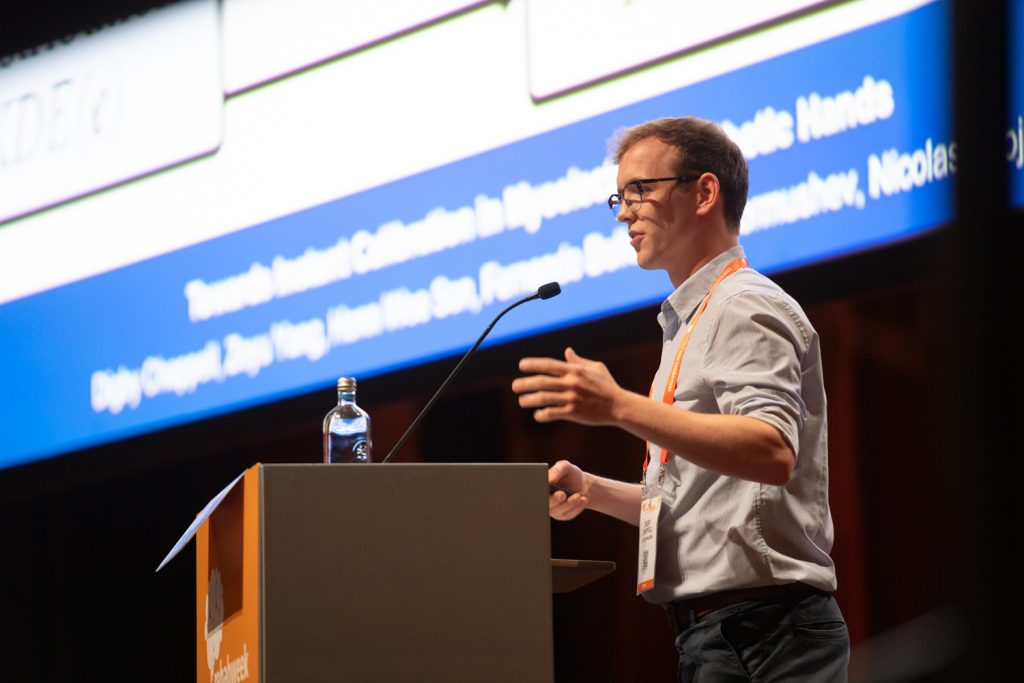
New Online Course: Introduction to AI for Clinical Researchers
We are excited to announce that our brand new #AI online course, commissioned by @NIHRresearch Clinical Research Network and co-developed with @Imperial_IGHI, is now available on the #NIHRLearn platform.
& interested in AI. The course covers a. Background & context of AI in healthcare in UK, b. Demystifying technical AI concepts , c. Practical considerations, ethics & regulation of AI.
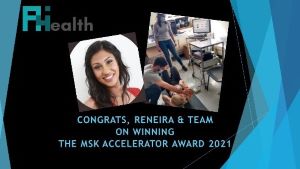
Congratulations to our student Reneira Seeamber who won the MSK Accelerator Award 2021 for her PlayBack project!
PlayBack is an innovative technology geared towards answering an unmet clinical need: Improving lower back pain using wearables. This award is worth £10,000 and offers industry-inspired product development support and management for the design and development of medical devices.
Our Centre, in collaboration with the AI Network, hosted the Symposium on AI in Future Health & Care in Autumn 2021. The goal of this policy symposium was to provide a forum for discussion on topics around the regulation for safe, effective and trusted use of AI.
Topics discussed included evidence based principles and standards, performance and evaluation pre-launch and in use, managing algorithm updates and evolution, whole system assessment and verification, bias and human factors, as well security and privacy risks. More details can be found on our Resources page.
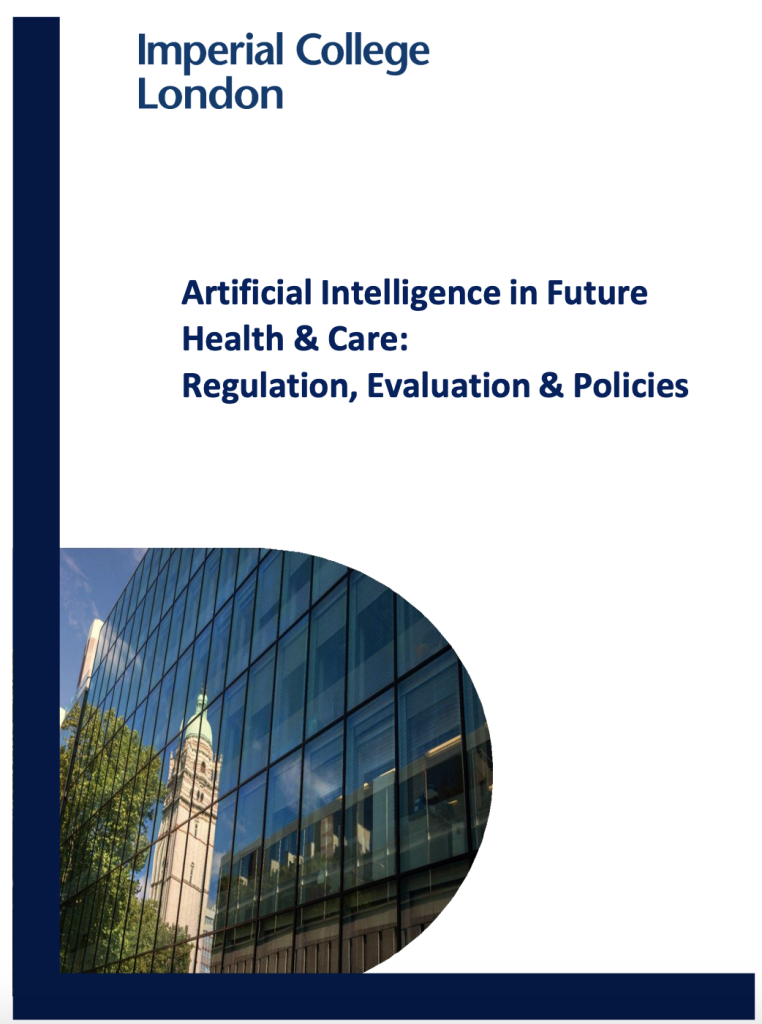
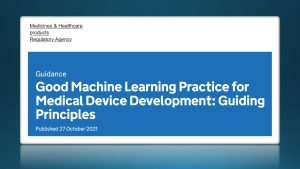
In October 2021, UK’s Medicines and Healthcare products Regulatory Agency (MHRA) together with the U.S. Food and Drug Administration (FDA) and Health Canada have jointly identified 10 guiding principles that can inform the development of Good Machine Learning Practice (GMLP). These principles will help promote safe, effective, and high-quality medical devices that use artificial intelligence and machine learning (AI/ML). Details here.
As part of our research training programme, the Centre launched an educational course on AI Innovation & Regulation in July 2021. This was a three day event that covered the following topics:
• How regulatory processes work for medical devices
• Clinical regulatory landscape & adoption for AI
• Overcoming obstacles innovators face
• Pioneering in the health AI space
• How to build AI with highest levels of safety
• Behavioural differences in adoption of innovation
The course was delivered in collaboration with experts from academia and the industry, including Imperial Business School, Digital Health London and Hardian Health.
The final day of the course featured a Dragons’ Den style exercise, where students worked in teams to prepare and deliver a product pitch for a ‘Dragons’ panel.
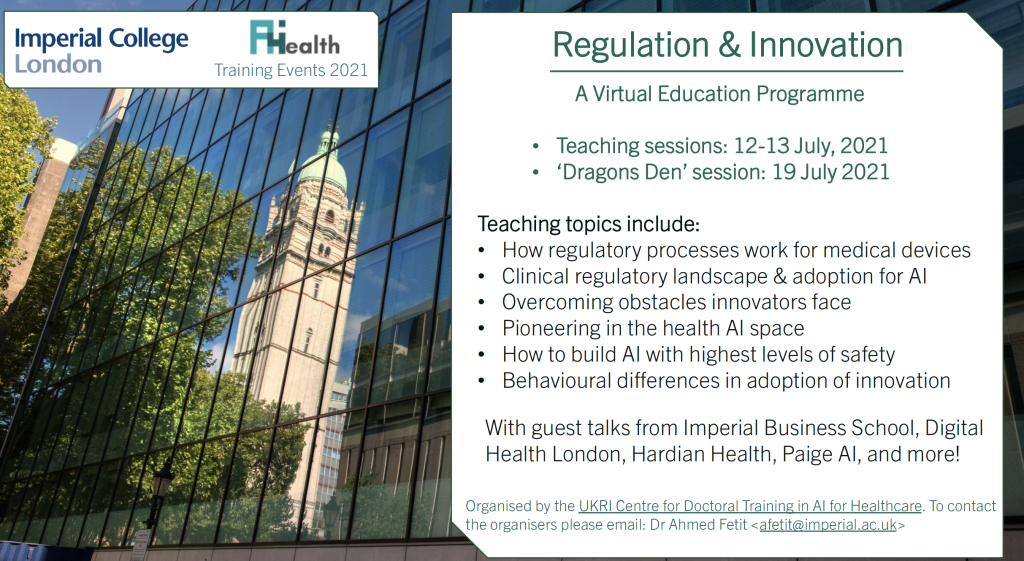
This is a fantastic example of how our CDT students move fluidly across the disciplinary AI and healthcare boundaries.
Aizaan Anwar – one of our clinically trained CDT students – was invited to the British Neuro-Oncology Society (BNOS) Annual Meeting 2021 to give a talk on her work entitled: “BrainApp: Using near-patient sensing through a mobile app and machine learning in brain tumour patients.”
Read the abstract here. Great work, Aizaan.
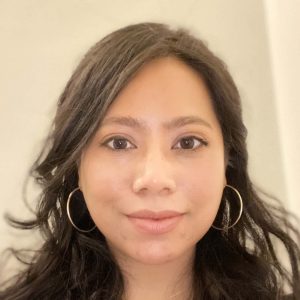

Will Bolton – one of our 1st-year doctoral researchers – visited AIME Conference 2021. A large part of the conference focused on the importance of explainability, which will be considered more rigorously in his research moving forward. He said he heard interesting talks on this which included using decision trees to explain a model’s predictions in a hierarchical manner. Interesting papers were also presented related to timeseries models, leading to the suggestion of using attention ahead of an RNN
for a potential performance jump
Giannis Afentakis – 1st Year CDT student – attended the ATTD Virtual Meeting 2021 (Advanced Technologies & Treatment for Diabetes) and thought it was a great opportunity to learn about the state-of-the-art research and innovation in the field of Diabetes Technology. Clinicians and Industry leaders talked about AI-enabled applications. This session provided lots of insight and updates on recent research on AI and Decision Support Systems in Diabetes Management which is the topic of his PhD.
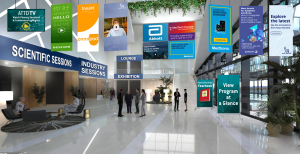
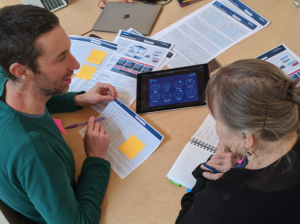
Student Alina-Irina Serban had a paper accepted in the JMIR Aging journal: “Smart Home Sensing and Monitoring in Households With Dementia: User-Centered Design Approach”.
The study proposes AI-powered technologies to help make living environment safe and appropriate for people living with dementia, taking into account medical and psychological needs of the people.
Clinical PhD Fellow Kavitha Vimalesvaran, MD, had a paper accepted at the European Heart Journal:
Congratulations Kavitha!
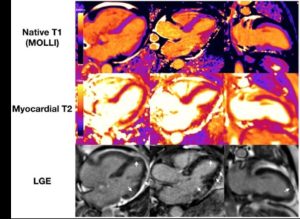

Reneira Seeamber won a place on the MedTech SuperConnector accelerator programme for her novel idea of an AI-assisted wearable to ameliorate chronic back pain.
This is a fantastic example of how AI technologies hold enormous potential in health and care!
In response to the Covid-19 emergency, clinical PhD Fellow Sumeet Hindocha and his team initiated a new study on how to use AI to identify to what extent changes seen on chest scans are due to coronavirus or the side effects of cancer treatment.
They said that a lot of the work they are doing is using AI on CT scan images to identify subtle changes in patients, which might help understand why one group of patients behave in a certain way. Read the story here.
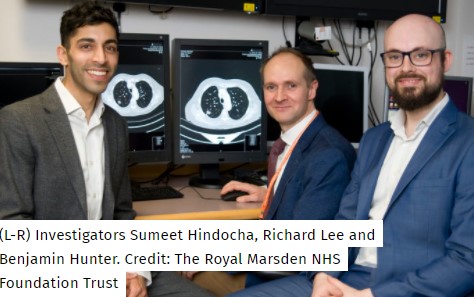
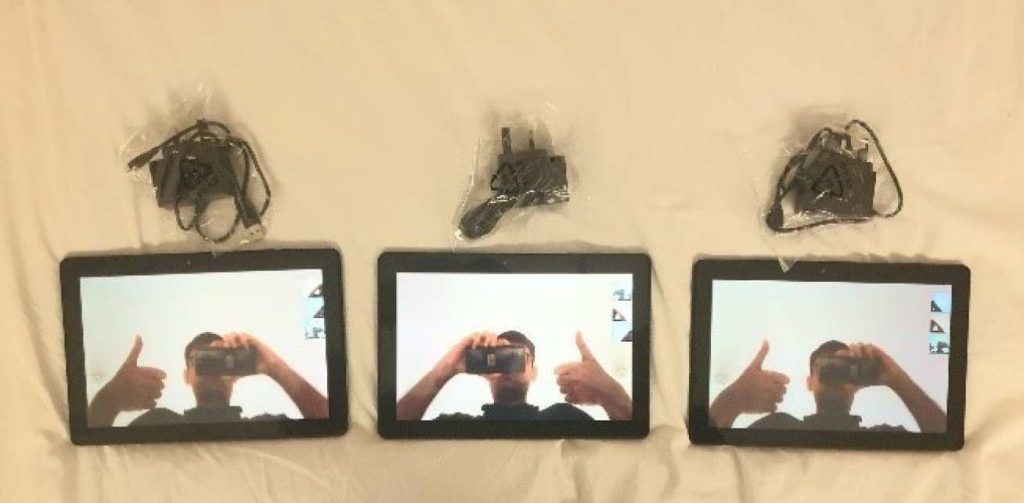
In Spring 2020, Clinical PhD Fellow Dr Sameer Zaman volunteered to treat and look after patients at Imperial College NHS Trust hospitals. He quickly realised that there was a need for mobile devices to help patient better contact with their families in times when they were isolated. Sameer then launched the #Virtual Visiting initiative to call for donations of tablets of phones to help patients who may be isolated, at a time when they may be feeling unwell.
Ruby Sedgwick had a paper accepted at the Machine Learning for Molecules Workshop at NeurIPS 2020: “Design of Experiments for Verifying Biomolecular Networks“.
This work looks into the design biomolecular networks using a Bayesian optimisation strategy.
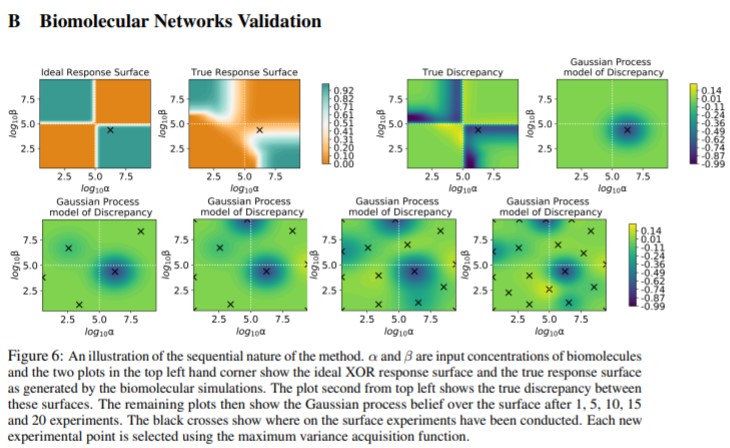

The UKRI Centre in AI for Healthcare opened its doors in October 2019 when the first cohort of researchers started their PhD. UKRI awarded over
£7 million to train leaders in artificial intelligence. We are delighted that we are training PhD students in both disciplines Artificial Intelligence and Healthcare and push this ground-breaking research further. Read the introductory story here.
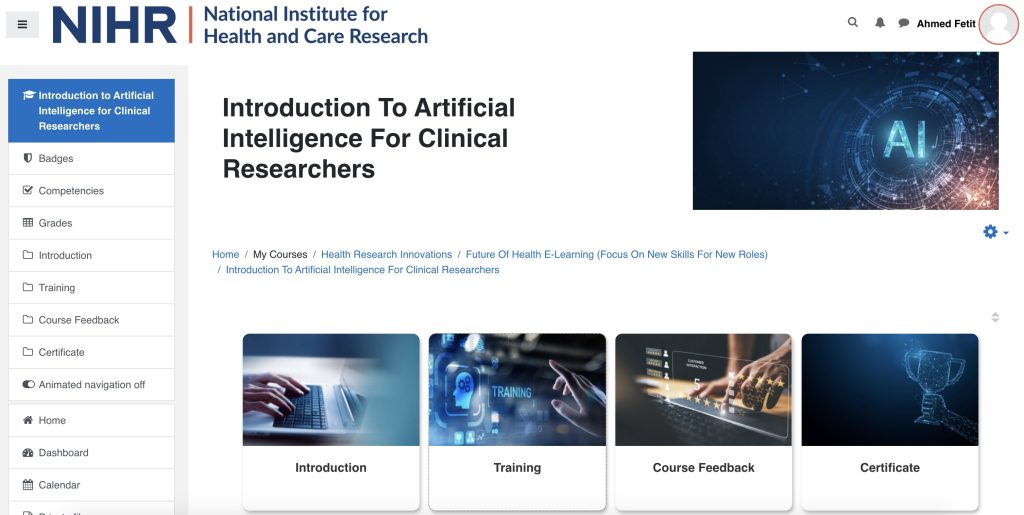
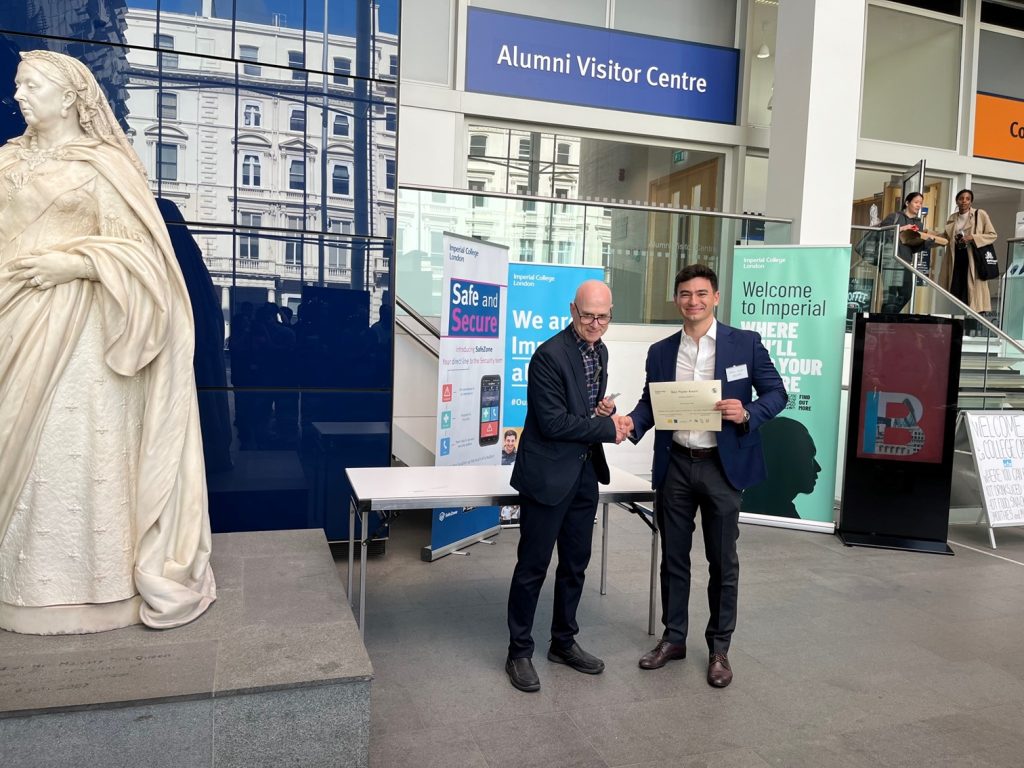
Congratulations to #AI4Health CDT researcher Berke Doga Basaran, on winning the Prize for Best Poster: “Lesion generation and Pseudo-healthy synthesis for Multiple Sclerosis, at the @ImperialAI Network event ‘Towards the Future of AI’, supported by our @AI4HealthCentre
Jun 2022
Clinician Aizaan Anwar was invited to present her research on a diagnostic tool for Brain (BT) progression at the Annual Conference of UKRI Centre for Doctoral Training in Speech & Language Technologies in June 2022. This is the first study using speech-based machine learning models for BT patients to predict brain tumour progression.
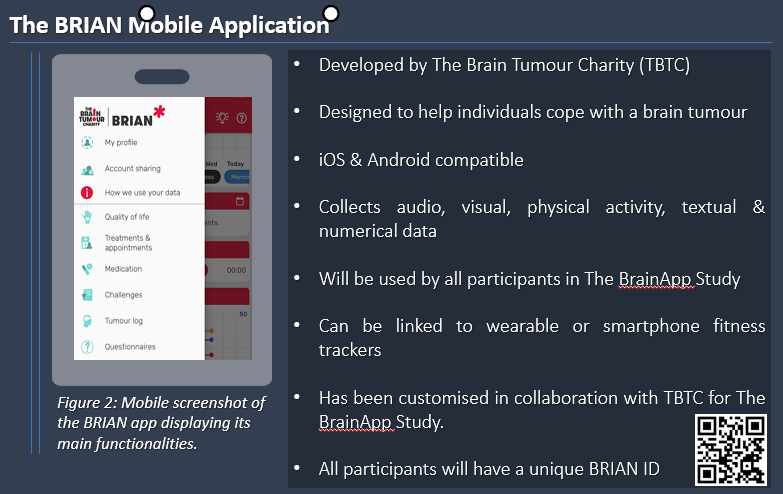
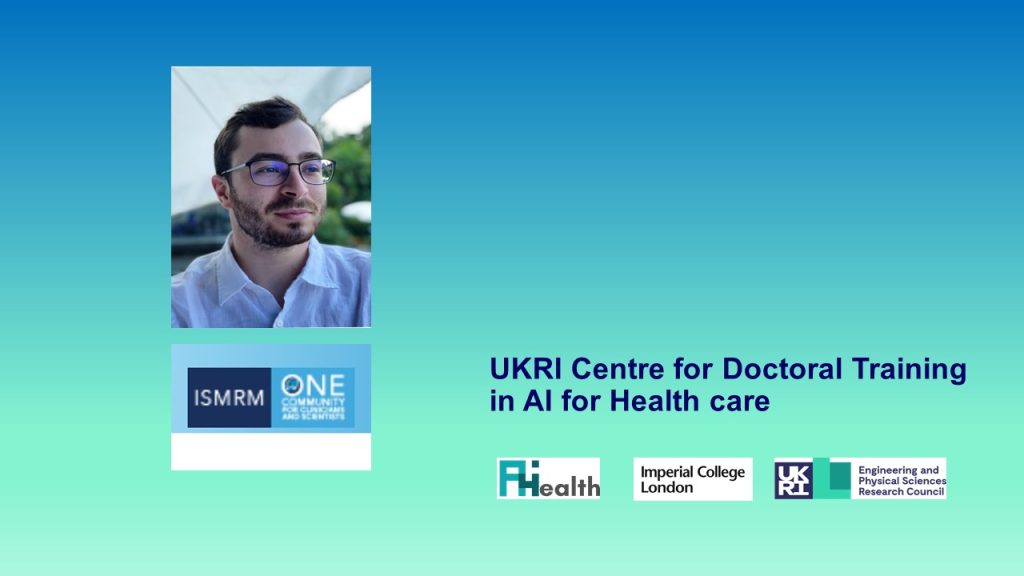
Michael Tanzer’s PhD involves in-depth knowledge about how MRI works and specifically how diffusion MRI works; and attending the International Society for MR Radiographers & Technologists (ISMRT)’s 2022 annual technical meeting in MRI research connected him with professionals and he learned about the main challenges in quantitative MRI and with the AI application to the field.
📢Adam Marcus – one of our #AI4Health clinical PhD fellows attended the European Stroke Organisation Conference (ESOC). His work focuses on applying AI to predict which stroke patients will benefit the most from treatment based on imaging features. Studies presented during the sessions suggested novel features to explore, such as intracranial calcification and revised clinical decision-making thresholds, such as more than ten cerebral microbleeds in haemorrhage risk prediction. Furthermore, networking opportunities have prospered new research collaborations, with teams in the Netherlands and Oxford.
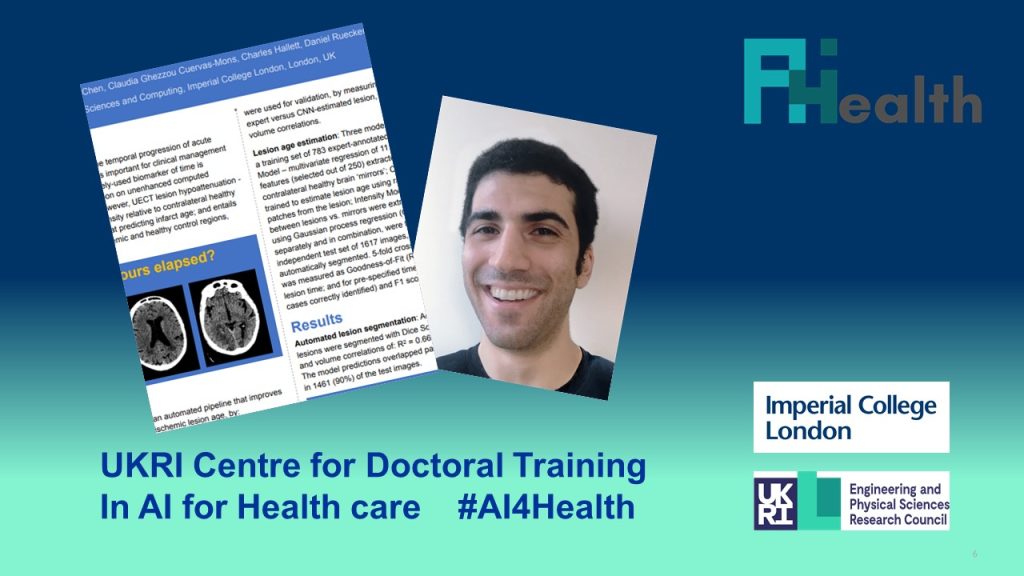
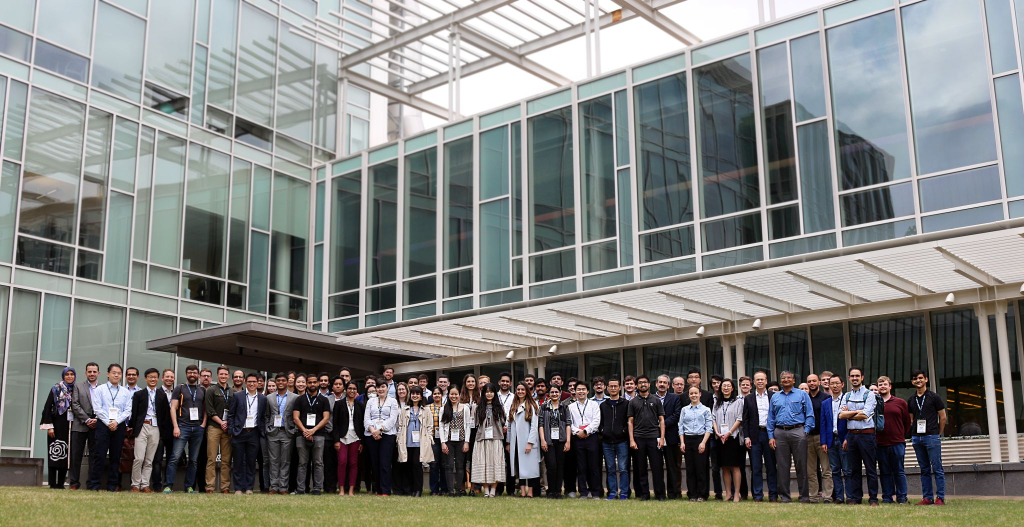
Annika Guez participated in the International Symposium on Medical Robotics (ISMR) which took place in NYC in April 2022. ISMR focused on medical robotics, mainly surgical robotics and assistive device. Selected presentations shared information that was interesting to learn about for her own research, for example terrain adaptation, user comfort, biomechanics, and natural gait kinematics.
📢Ariane Duverdier #AI4Health PhD researcher gave a poster talk at the BSID conference in April 2022. This was a great opportunity to introduce a clinical audience to AI methods she is researching on, to design personalised prognostic tools for eczema skin conditions. She networked with clinicians to discuss some of her results and how
they may impact clinical practice. @TanakaGroup #SystemsMeds
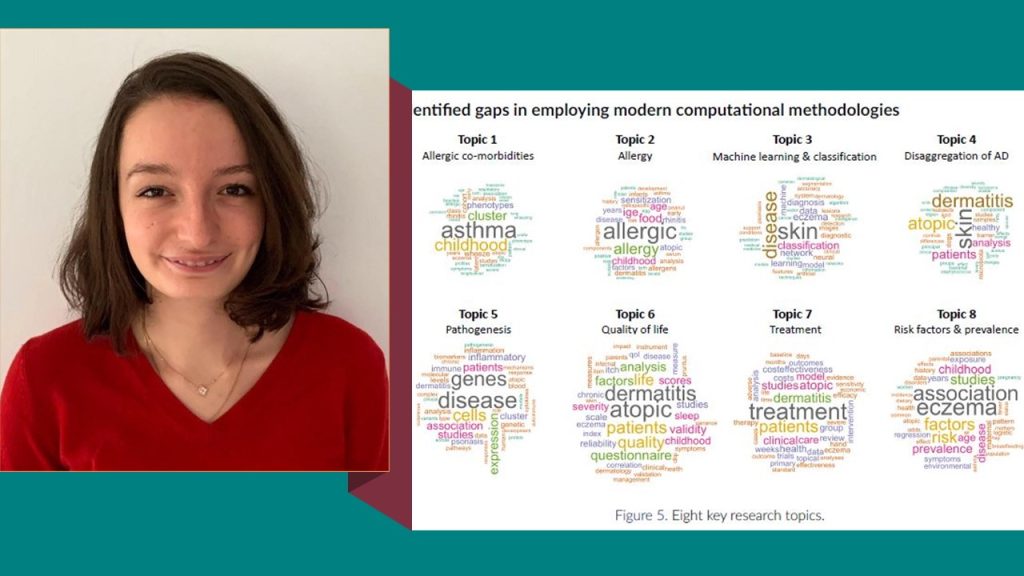

PhD researcher Annalaura Lerede attended the Cognitive Neuroscience Society (CNS) conference in April 2022, presenting her work on the Development of internet-based tools for assessment and monitoring of cognition in multiple sclerosis patients.
Kai Zhang attended the 6th AAAI International Workshop on Health Intelligence which showcased a broad range of research from the health intelligence community ranging from machine learning applications, to drug discovery and genome analysis, to theoretical works on algorithms. He presented his work on federated Cox models. The workshop not only forged new connections with other labs but also inspired ideas for future work.
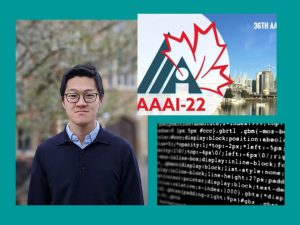
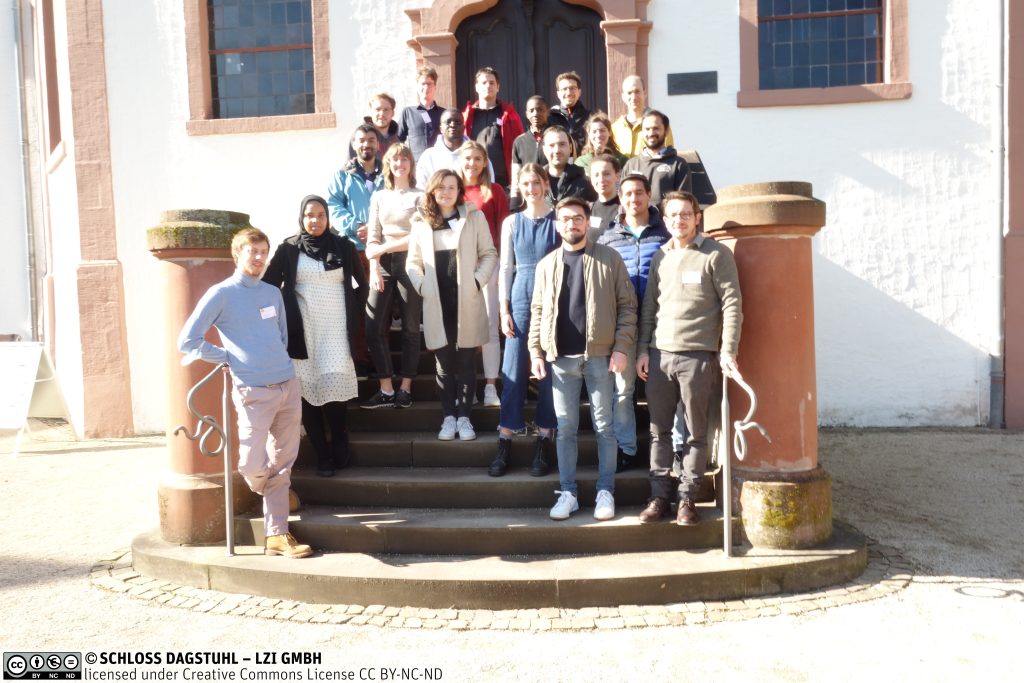
Ruby Sedgwick [middle with red shirt] participated in a week-long meeting at Dagstuhl Schloss, Germany, which brought together AI researchers for Humanitarian Work. AI experts met with non-profit organisations to discuss the most pressing challenges, what latest AI technologies are available to solve them, and also to build wider networks. Read the full story here.
Digby Chappell gave a talk about “Assistive Technology-Perspectives from end-user”; a more high-level talk than most technical talks. This was an opportunity to hear the experience of explorer and charity fundraiser Alex Lewis who has been involved with research at Imperial.
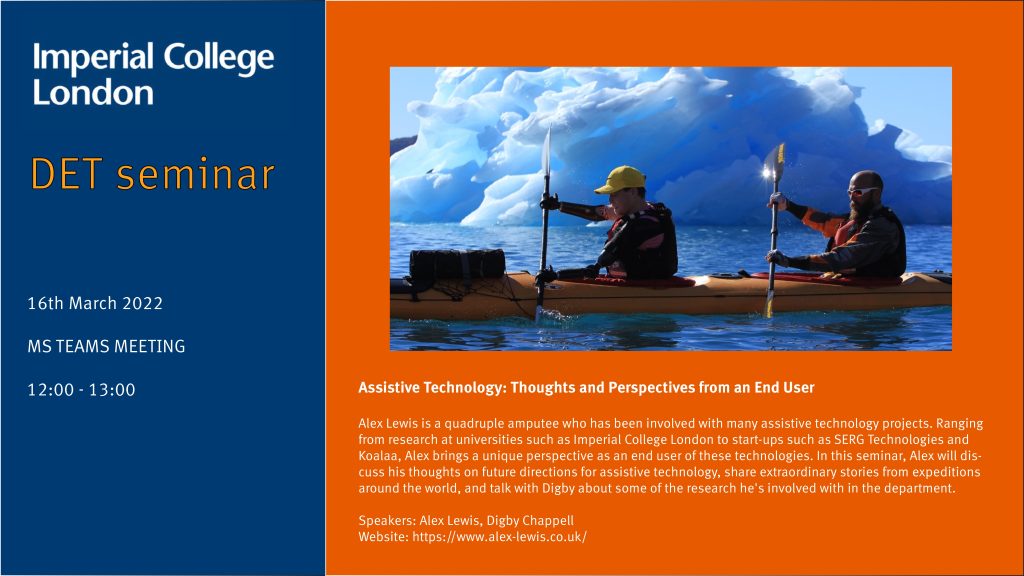
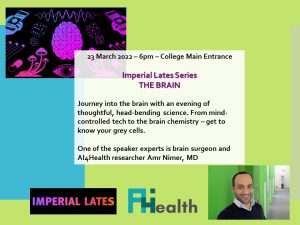
Journey into the Brain, event in March 2022. It was fantastic to hear more about mind-controlled technology, about how utilising AI can improve surgical expertise and what a day of a brain surgeon’s life looks like.
Do you treat non-small cell lung cancer (NSCLC)? Interested in AI & Machine Learning approaches for improved prognostication? Check out the journal paper by Sumeet Hindocha, MD, et al., in The Lancet’s EBioMedicine .
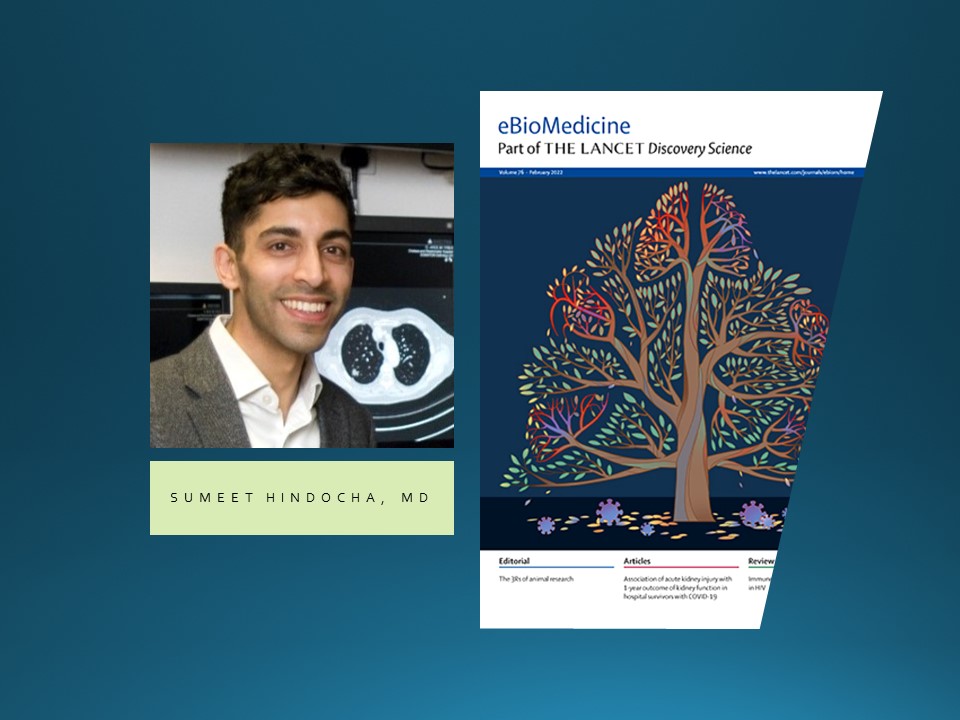
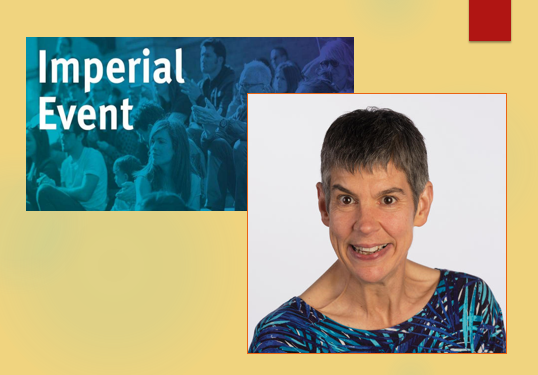
At our AI Seminar on 9 March 2022, Annalu Waller PhD OBE is Professor of Human Communication Technologies and the Academic Lead for Computing at Dundee University, Scotland, talks about Supporting extended conversation for people using Augmentative and alternative communication (AAC). AAC attempts to augment natural speech, or to provide alternative ways to communicate for people with limited or no functional speech. Technology provides access to voice output and plays an important role in AAC. At the simplest level, people with complex communication needs (CCN) can cause a prestored message to be spoken by activating a single switch. At the most sophisticated level, literate users can generate novel text.
Alistair Weld’s PhD research is about automated robotic solution for intraoperative ultrasound for brain resection, in collaboration with the German Technical University Munich (TUM) and the German Aerospace Center (DLR). In January 2022 he went to meet the Teams in Germany and push forward their work on navigating the robotic arm control algorithms, gaining insight into how DLR operate and into the breadth of application and potential of robotic arms.
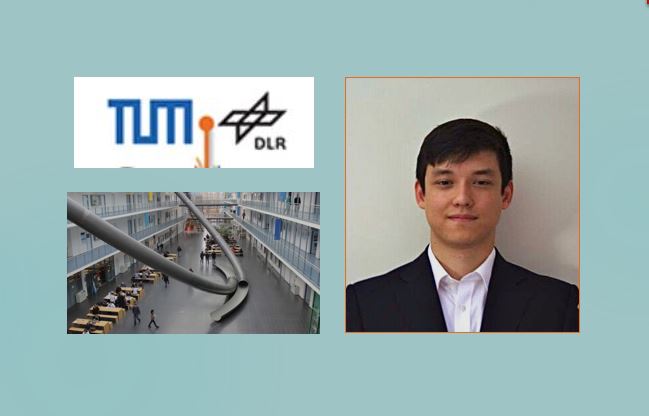
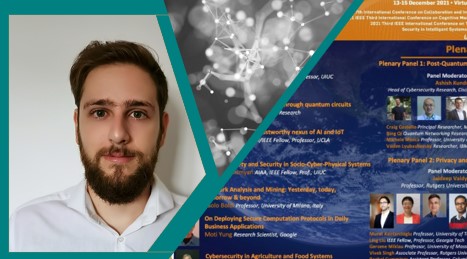
Neophytos Polydorou had 2 papers accepted to the 2021 IEEE CogMI – International Conference on Cognitive Machine Intelligence, one called An Empathetic AI Coach for Self-Attachment Therapy and the other Valence/Arousal Estimation of Occluded Faces from VR Headsets. At the research workshops he enjoyed the discussions with the audience about his papers. He said it was great to learn about various fields and technologies, such as Edge-AI, IoT, NLP, Quantum Computing, Networks, Cyber-security, and a platform for trustworthy, secure and reliable machine learning in a hospital setting.
Dimitar Georgiev, who started his PhD in October 2021, also attended NeurIPS 2021 and found that this conference was a major success for AI that showcased novel research in both fundamental and translational research. He explained that the conferences allowed him to explore various sessions which are and will be very useful for his own research on deep learning for cerebral organoid phenotyping and drug discovery. Talks and workshops on graph representation learning, graph neural networks, geometric deep learning, (variational) autoencoder architectures, transformers and Gaussian processes were also very interesting and inspiring for him.
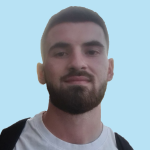
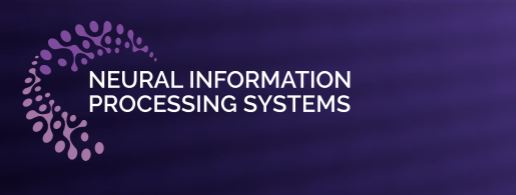
NeurIPS is a popular leading AI conference our CDT students attend. Hadrien Reynaud attended NeurIPS 2021 to present a workshop paper on using Style Transfer and Reinforcement Learning to automatically find the 4-chamber view of the heart in CT volumes. The workshop also provided insights into early work in the medical imaging field. Hadrien was also keen to learn more about causality which is a growing topic in the field of machine learning and has not yet been applied to medical imaging.
Dimitar Georgiev attended the 2021 Nvidia GTC, a developer conference for the era of AI. He thought that this was a fantastic opportunity to join sessions where researchers, creators, IT and business leaders explored AI and HPC approaches in the field of healthcare. For example, he participated in talks on how to accelerate deep learning pipelines with HPC and distributed computing which are now easier than ever to apply with the development of packages and libraries, such as NVIDIA’s CUDA, CuNumeric, Triton, etc. He also joined discussions on how such methods can be used to accelerate AI-driven healthcare applications, most notably with NVIDIA’s new frameworks called Clara Discovery and Clara Holoscan, which help speed up drug discovery processes and medical imaging.

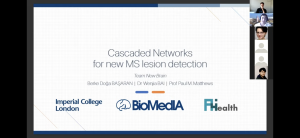
Doga Basaran, 2nd year PhD researcher, attended the MICCAI conference 2021 and its MSSEG-2 Challenge, the Educational Challenge of the conference, presenting a talk on ‘Cascaded Networks for new MS lesion detection’. The main goal of this challenge -which is led by the MICCAI Student Board- is to provide educational material for researchers in the field of medical image computing and computer-assisted interventions. Doga said it was exciting to see latest state-of-the-art methods and what different methods other teams developed.
Clinical PhD fellow Sumeet Hindocha, MD, participated in the Industry Xchange Retreat, which was combined with an Entrepreneurial Masterclass for the London Tech Week. This retreat was themed according to the government’s Industrial Strategy challenges and offered a unique opportunity for UKRI-funded researchers for enhanced professional development through interaction with industry. As an AI for Healthcare fellow, Sumeet found that the workshops of the Forum HealthTech Summit were super useful as they could practice effective pitching of healthcare tech ideas. He said that he would recommend the retreat to other students.
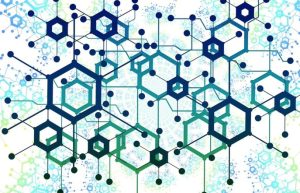

Congratulations to our student Reneira Seeamber who won the MSK Accelerator Award 2021 for her PlayBack project!
PlayBack is an innovative technology geared towards answering an unmet clinical need: Improving lower back pain using wearables. This award is worth £10,000 and offers industry-inspired product development support and management for the design and development of medical devices.
Our Centre, in collaboration with the AI Network, hosted the Symposium on AI in Future Health & Care in Autumn 2021. The goal of this policy symposium was to provide a forum for discussion on topics around the regulation for safe, effective and trusted use of AI.
Topics discussed included evidence based principles and standards, performance and evaluation pre-launch and in use, managing algorithm updates and evolution, whole system assessment and verification, bias and human factors, as well security and privacy risks. More details can be found on our Resources page.


In October 2021, UK’s Medicines and Healthcare products Regulatory Agency (MHRA) together with the U.S. Food and Drug Administration (FDA) and Health Canada have jointly identified 10 guiding principles that can inform the development of Good Machine Learning Practice (GMLP). These principles will help promote safe, effective, and high-quality medical devices that use artificial intelligence and machine learning (AI/ML). Details here.
As part of our research training programme, the Centre launched an educational course on AI Innovation & Regulation in July 2021. This was a three day event that covered the following topics:
• How regulatory processes work for medical devices
• Clinical regulatory landscape & adoption for AI
• Overcoming obstacles innovators face
• Pioneering in the health AI space
• How to build AI with highest levels of safety
• Behavioural differences in adoption of innovation
The course was delivered in collaboration with experts from academia and the industry, including Imperial Business School, Digital Health London and Hardian Health.
The final day of the course featured a Dragons’ Den style exercise, where students worked in teams to prepare and deliver a product pitch for a ‘Dragons’ panel.

This is a fantastic example of how our CDT students move fluidly across the disciplinary AI and healthcare boundaries.
Aizaan Anwar – one of our clinically trained CDT students – was invited to the British Neuro-Oncology Society (BNOS) Annual Meeting 2021 to give a talk on her work entitled: “BrainApp: Using near-patient sensing through a mobile app and machine learning in brain tumour patients.”
Read the abstract here. Great work, Aizaan.


Will Bolton – one of our 1st-year doctoral researchers – visited AIME Conference 2021. A large part of the conference focused on the importance of explainability, which will be considered more rigorously in his research moving forward. He said he heard interesting talks on this which included using decision trees to explain a model’s predictions in a hierarchical manner. Interesting papers were also presented related to timeseries models, leading to the suggestion of using attention ahead of an RNN
for a potential performance jump
Giannis Afentakis – 1st Year CDT student – attended the ATTD Virtual Meeting 2021 (Advanced Technologies & Treatment for Diabetes) and thought it was a great opportunity to learn about the state-of-the-art research and innovation in the field of Diabetes Technology. Clinicians and Industry leaders talked about AI-enabled applications. This session provided lots of insight and updates on recent research on AI and Decision Support Systems in Diabetes Management which is the topic of his PhD.


Student Alina-Irina Serban had a paper accepted in the JMIR Aging journal: “Smart Home Sensing and Monitoring in Households With Dementia: User-Centered Design Approach”.
The study proposes AI-powered technologies to help make living environment safe and appropriate for people living with dementia, taking into account medical and psychological needs of the people.
Clinical PhD Fellow Kavitha Vimalesvaran, MD, had a paper accepted at the European Heart Journal:
Congratulations Kavitha!


Reneira Seeamber won a place on the MedTech SuperConnector accelerator programme for her novel idea of an AI-assisted wearable to ameliorate chronic back pain.
This is a fantastic example of how AI technologies hold enormous potential in health and care!
In response to the Covid-19 emergency, clinical PhD Fellow Sumeet Hindocha and his team initiated a new study on how to use AI to identify to what extent changes seen on chest scans are due to coronavirus or the side effects of cancer treatment.
They said that a lot of the work they are doing is using AI on CT scan images to identify subtle changes in patients, which might help understand why one group of patients behave in a certain way. Read the story here.


In Spring 2020, Clinical PhD Fellow Dr Sameer Zaman volunteered to treat and look after patients at Imperial College NHS Trust hospitals. He quickly realised that there was a need for mobile devices to help patient better contact with their families in times when they were isolated. Sameer then launched the #Virtual Visiting initiative to call for donations of tablets of phones to help patients who may be isolated, at a time when they may be feeling unwell.
Ruby Sedgwick had a paper accepted at the Machine Learning for Molecules Workshop at NeurIPS 2020: “Design of Experiments for Verifying Biomolecular Networks“.
This work looks into the design biomolecular networks using a Bayesian optimisation strategy.


The UKRI Centre in AI for Healthcare opened its doors in October 2019 when the first cohort of researchers started their PhD. UKRI awarded over
£7 million to train leaders in artificial intelligence. We are delighted that we are training PhD students in both disciplines Artificial Intelligence and Healthcare and push this ground-breaking research further. Read the introductory story here.